#it was also unsurprisingly the most nominated song
Text
the poll for how to arrange the brackets just finished with proceeding as originally planned winning!
so, without further ado, here are the lineups ^^
note :: songs with a * next to them may require a content warning. i'll provide specific warnings as soon as i have the time, but as of now please proceed with caution
main matchup bracket ::
alice of human sacrifice* by yugami p / fear garden* by chaa
magnet by minato p / romeo and cinderella by doriko
world is mine by ryo / world's end dancehall by wowaka
triple baka by lamaze p / the disappearance of hatsune miku by cosmo p
meltdown by iroha(sasaki) / luka luka★night fever by samfree
fire◎flower by halyosy / trick and treat by oster project
daughter of evil by mothy / dancing★samurai by kanimiso p
rolling girl by wowaka / matryoshka by hachi
madness of duke venomania* by mothy / alluring secret ~black vow~ by hitoshizuku x yama
senbonzakura by kurousa / outer science by jin
doubleganger by kulfiq / mikusabbath by utsu p
jinsei reset button by kemu / common world domination by pinnochio p
the fox's wedding* by masa works design / tokio funka by takamatt
heat haze days by jin / patchwork staccato by toa
six trillion years and an overnight story by kemu / lost one's weeping by neru
aishite aishite aishite by kikuo / echo by crusher p
setsuna drive by taki yoshimitsu / yoake to hotatu by n buna
a fake fake psychotropic by kairiki bear / therefore you and me by tadanoco
my r* by kurage p / i'm glad youre evil too by pinnochio p
chururira chururira dadada by kurage p / mkdr by deco*27
blessed messiah and the tower of ai by hitoshizuku x yama / 86 by dasu
law evading rock by neru / nakakapagpabagabag by dasu
sand planet by hachi / ghost rule by deco*27
monster by kira / hated by life itself by iori kanzaki
cause i'm a liar by mcki robyns p / honey i'm home by ghost
hole dwelling by kikuo / bring it on by giga
meteor by divela / seraphim on the ring by mitchie m
the court jester by thquib / casino by azari
king by kanaria / villain by teniwoha
lower by lanndo / phony by tsumiki
higanbana milk tea by vane / scapegoat by ghost
queen by kanaria / bug by kairiki bear
honorable mention bracket ::
electric angel by yasuo p (original), giga (giga arrange) / freely tomorrow by mitchie m
po pi po by lamaze p / go google it by wintermint p
black★rock shooter by ryo / bacterial contamination by kanimiso p
i like you, i love you by gevanni p / first love academy • school of true love by nem
(also a quick general note ! i don't have everything ready for a formal polished reveal at the time of posting this. i plan on updating this post with links to the songs and also a visual bracket when i have the time. they'll definitely be up soon, so make sure to check back in a bit for them ^^
i'll also make sure that reblogs are turned on for the final version!)
#vocaloid song showdown#sorry it's just a list for now i promise i'll update it and make it look nicer as soon as i get the chance :'D#i'll also add the playlists to the final post so those will finally be out soon too !#but for now it's just a quick little post to get the matchups out sooner rather than later since this is already kinda behind schedule :')#anyway it's still kinda bonkers to me that only one person nominated po pi po and electric angel#those songs used to be Everywhere it felt like#and unless i continually missed it no one sent in llevan polka :(#(to be fair itnisn't originally a vocaloid song. idk if i could fully qualify it bc of that but still shocked that it got no nominations)#oh also ! until i have the image finalized if anyone thinks any matchups should be tweaked at all feel free to lmk !#i was mostly judging popularity based on nominations and view count (reprints included) but it was hard to tell for some ???#like i remember a whole bunch of reprint channels getting deleted or privating all their videos and i'm sure that impacted some view counts#and rolling girl in particular has a lot less views than i thought it would ???#it's not a small amount by any means but it also seems to be on the higher side of the average for the final bracket songs#it was also unsurprisingly the most nominated song#so some of the matchups were a bit weird and wonky to put together fhdkfh#(especially echo actually too ? it got 2 nominations and barely made it but has the highest view count out of all the songs last i checked)#anyway all that to say if anyone wants to give feedback on the bracket pairings i'm open to it until i get the formal version up ( ^^)b#additionally if i missed any songs that should have some sort of warning please let me know fhdkdh#i added them only off the top of my head so i might've missed one#(the final version of this will have more specific warnings too. potential flash warnings as well)#EDIT :: changed up within 24 hours to up soon#i wish i could've had everything together within 24 hours but things came up and i need just a little more time :(#but i wanna get started on voting monday (february 27) for real this time ! no more putting it off :'D
29 notes
·
View notes
Text
Colin & Jared and another Dublin thing that connects them: U2
Colin Farrell and Jared Leto have one thing in common beyond a doubt: their affinity for the band U2. Not only affinity for, but also proximity to them.
Jared & U2
Let's look at the picture below. It hints at U2 gifting the Leto brother's band Thirty Seconds to Mars (30STM) a lot of Guinness and Champagne and leaving their 'best wishes' and a recipe to mix all of that together after 30STM's Dublin concert on May 30, 2018.
Pretty friendly. Yeah, and why not?
In 2017 Jared had in fact presented the 'Global Icon' Award To U2 at the MTV EMAs like a good ol' friend and with a lot of praise, framing the influence of U2's 1987 album The Joshua Tree on Shannon and him in the 80ies like some kind of founding myth for 30STM. It's not even hyperbole: they had frequent U2 collaborators Steve Lillywhite and Flood produce their album This Is War (2009) and Lillywhite Love, Lust, Faith + Dreams (2013). Unsurprisingly they sound very U2ish.
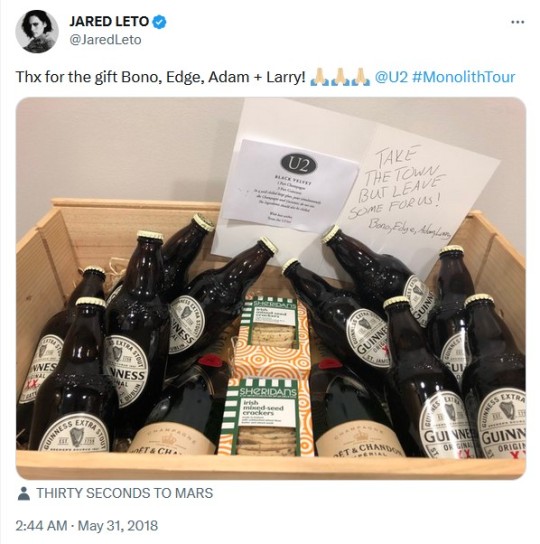
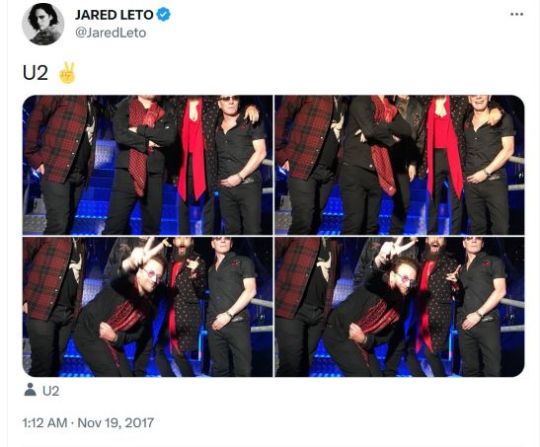
Fun fact: the picture was posted on Twitter on May 31 - Colin Farrell's 42nd birthday.
Colin & U2
Colin Farrell is some kind of honorary member of U2 since - forever. A google search reaps plenty of evidence of him going to concerts or hanging out with them at PR events, award shows or just hanging out.
He's so close with the band, he even met his on-off-girlfriend through them, who was The Edge's PA. It's not only him, all Farrells are friendly with the band. In 2011 Bono attended Eamon Farrell's birthday party, who's Colin's brother, even though Colin wasn't present, and so on. I don't know if this is a common Dubliner thing, maybe all Dubliners know U2 personally in some way...
Fun fact: Colin's godmother and aunt Martina is married to a man who owned U2's favorite club among others in the 1980ies. U2 once flew from somewhere in Europe back to Ireland just to go to that club.
In 2003, Colin, at the height of superstardom, and Bono were practically glued together. The picture below shows them at an Oscar party (Jared was there too).
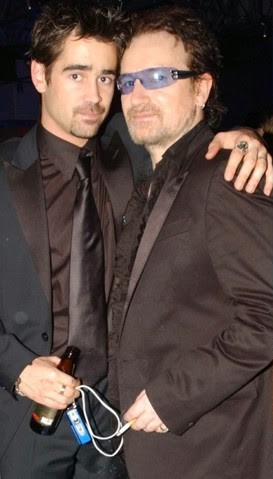
Jared & U2
Jared has crossed paths at least with The Edge and Bono long before 2017. No wonder as Bono is a sucker for fame and money and has been mingling in Hollywood society for decades. In 2003, the year Colin was glued to Bono's side, Jared's hardly been a total stranger to the "U2'ers" either...
The picture below shows him at a Golden Globes party in 2003. (Colin was there too) Jared's girlfriend Cameron Diaz, at the height of her stardom and who would dump him for Justin Timberlake shortly after this, had starred in Scorsese’s Gangs on New York (2002). U2 had written a song for the soundtrack and won a Golden Globe award for it, but not the Oscar. In fact, the movie won none of its ten nominations. All Oscar hopes for that movie were squashed.
We see Jared here kind of cockblocking/chatting up Daniel Day Lewis whom he to this day quotes as an inspiration and role model as an actor.
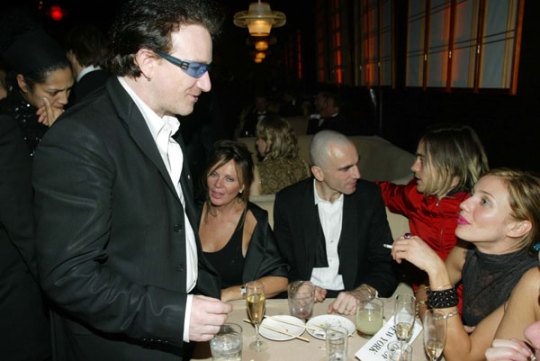
Colin & Jared & U2
Alexander (2004) was shot on three different locations in Morocco, England and Thailand from late September 2003 to mid February 2004. Right after returning home from the Alexander set in Thailand, Jared started to perform Where the streets have no name (WTSHNN) at 30STM concerts. Along with this the infamous Alexander-ish song A Modern Myth was played live for the first time, which made it the first song from their 2005 album A Beautiful Lie that saw the light of day.
After shooting for months with ultra U2 fan Colin, choosing a U2 song that talks of sunlight, dust clouds, poison rain, the desire to break free and be together - and desert plains.... Hello Morocco nostalgia?! Most of the cast were Irish dudes culturally socialized in the 80ies. I can easily imagine this song being an unoffical hymn at parties. Besides Macarena, maybe.
I think, for Jared WTSHNN is linked to the experience of shooting Alexander, which he said was full of "adventures" and changed his life and let him "fall in love with the desert". Both Jared and Colin have talked about the "amazing" experience they had in Morocco. It's telling that after general shooting for Alexander had stopped merely a week prior (Feb 13, 2004), Jared flew back to L.A., still looking like Hephaistion and all, and played these two songs.

In 2008 Colin and Jared were in Park City, Utah, for several days. Why?
The Sundance Film Festival.
Colin promoted In Bruges (2007) and the documentary Kicking it (2008). He was executive producer and narrator for the latter. In Bruges was set as the opening night film and premiered on January 17. The film would rehabilitate Colin as an actor after the ill-received Alexander had almost tanked his career and plunged him into the arguably most severe personal crisis of his life.
In January 2008 Colin was 31 years old and 24 months into his struggle for sobriety. His little son had been diagnosed with a rare genetic disorder that would impede his intellectual development and come with medical complications. Colin's had to wrestle with a stalker, with the publication of an unauthorized sex tape and a romantic liaison with a 21-year-old medical student that took a morbid turn when her depressive ex-boyfriend couldn't handle the break-up and committed suicide. And certainly there were some more problems that didn't go public.
In Bruges though would win him a Golden Globe 2009. A ray of light on the horizon...
Fun fact: Colin's character is named Ray. Jared had played a Ray before in Lonely Hearts Killers (2006) with Salma Hayek, who had starred alongside Colin in Ask the Dust (2006) right before she went on to shoot with Jared. A character called Rayon would then be Jared's Oscar ticket in 2014.
Jared had no movies to promote at Sundance 2008, he was just there... he hopped from party to party accompanied by Brent Bolthouse - a man generally described as a L.A. "nightlife impresario and businessman" - to whom Jared was glued to in public for most of the 2000s until he was suddently and inexplicably not. Jared's most memorable contribution to the festival that year was making out with Paris Hilton for some reason.
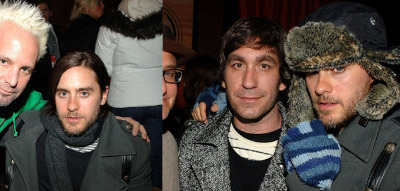

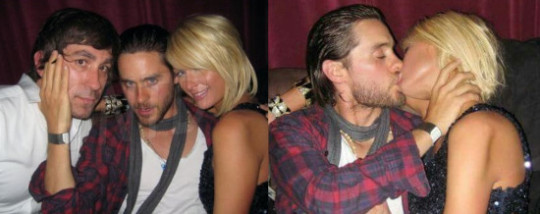
Jared and Colin with festival director Geoff Gilmore.


On January 19, 2008 U2 graced the Park City, Utah with their presence to introduce another of their vanity projects: U2 3D. "U2 3D mobilizes digital 3-D and surround-sound technology to plunge us into almost supernatural proximity to the musicians." Alright...
Jared and Brent attended the first screening of U2 3D. The two screenings and parties for U2 3D were the hottest tickets in town that year. Long waiting lines and exclusive guest lists.
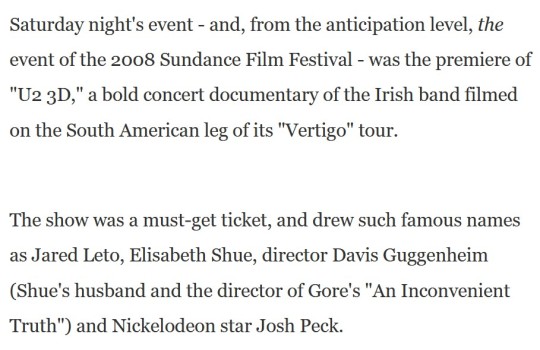
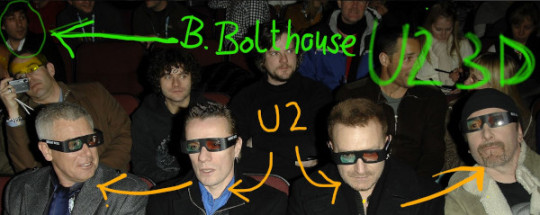
Before the screening there was a U2 3D cocktails and dinner party at the Bon Appetit Supper Club. Colin was invited. He's chatting to the U2 3D director Catherine Owens here.
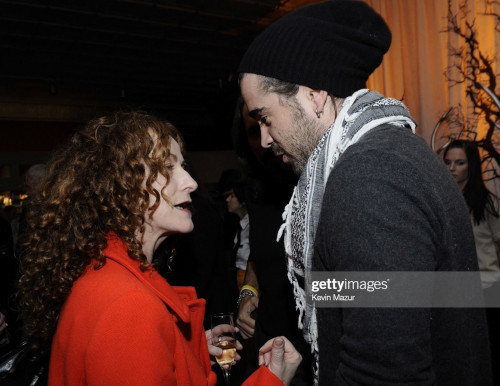

But he left early to attend the screening of Kicking it. From there he went to the after party at Greenhouse at the top of Main and hung out some more with Brendan Gleeson and Mary-Kate Olsen. The U2 3D after party was at the same place. One party became the next and Colin and the U2ers were present.


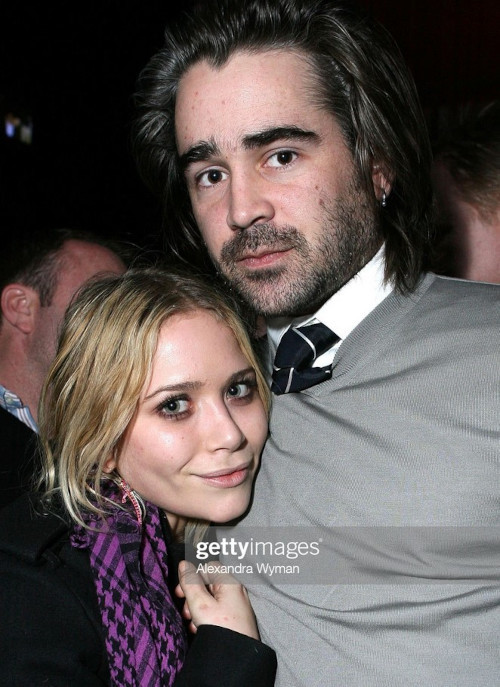
The picture shows Colin and Mary-Kate cuddling at the In Bruges party, two days before the U2 3D premiere.
Fun fact: Mr. Leto isn't a stranger to the Olsen twins, especially Ashley, either...
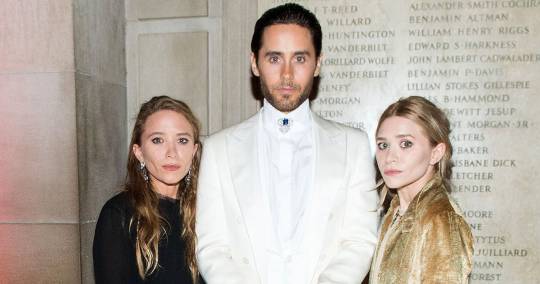

I'm pretty sure the two well-connected L.A. hipsters Leto and Bolthouse didn't miss out on the U2 3D after party. There were rumors of the band performing there, which didn't happen in the end. They somehow had secured tickets for the screening, which, by all accounts, wasn't an easy task, they probably made their way inside the after party as well.
It's improbable that Colin and Jared roamed the same street at the same festival for some days, and didn't take notice of each other, not even amidst the U2 hype in that year.
Especially when an Irish newspaper article would quote Jared saying something like this shortly after this (January 25, 2008):
I don't know if you've spent any time in Colin's company, but that guy is just so amazing. His zest for life is infectious. I consider him to be a good friend and hopefully if he's in Dublin when we're there, we'll get to hang out.
So why not hang out in Park City? Proof of this "good friendship" is hard do come by since at least 2004.
U2 360° tour 2009
So this is Jared in a workflow in his home studio cutting the Kings and Queens music video. Only two months to go until the release of This Is War. Maybe he's a bit distracted because all the celebrities flock out to Pasadena to see U2 on their 360° tour at the Rose Bowl. Among them - of course - Colin Farrell, seen here in the backstage area. He's found himself a second baby mama while filming a movie with her the year before.
Fun fact: the liaison unfortunately overlapped with his relationship with writer Emma Forrest to whom he also proposed parenthood, as one can read in her very fine, bittersweet memoir Your Voice In My Head (2011).
Her name is Alicja Bachleda-Curuś. She's 26 years old in this picture (baby daddy is 33) and has delivered a baby son only 18 days ago but you wouldn't know it just looking at her. It's unclear whether the reIationship at this point is still a romantic one, or if it ever really was, because he was already busy thinking about Elizabeth Taylor when he came home from the hospital. Alright... Alicja's baby daddy is about to dump her, but provide for her. That kind of thing.
I somehow love that Henry is her spitting image nowadays!
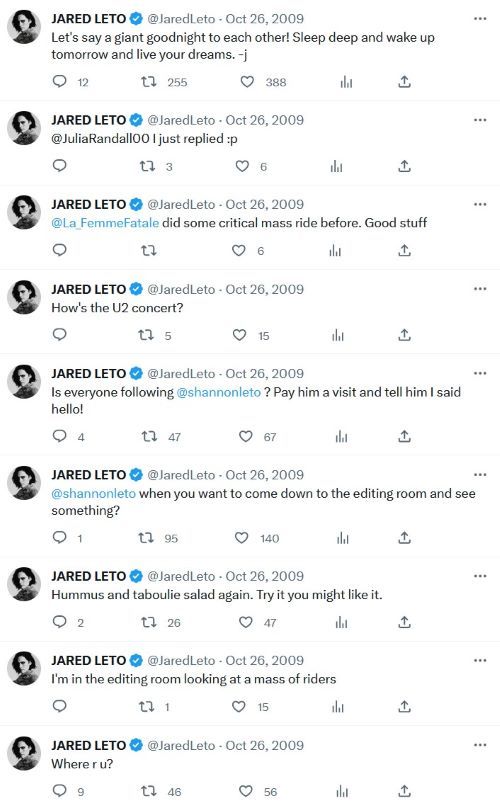

MTV Unplugged (2011)
In 2011 30STM performed a very good version of WTSHNN during their session. Obviously still fans of the song.

Fun fact: Colin was in NYC on the day (May 13) the MTV Unplugged session with the WTSHNN cover was recorded.
He was papped around Times Square, early and late evening in front of the (then) Foxwoods Theatre (right next to the New Victory Theater) looking a bit pissed.
Apparently he was on his way to a preview performance for the ill-fated Spider-Man musical Turn off the dark that had music written by his buddies Bono and The Edge. After a hiatus for creative overhaul preview shows had begun again May 12th.
Fun fact: this whole Spiderman musical idea suffered from hubris, not unlike Alexander had, which was mostly rooted in this constellation:

Other pics and a video of Colin were taken in front of the Mandarin Oriental hotel, wether it was the next morning or not is hard to tell. Colin takes a cab and off he goes… He's in different attire and not accompanied by his sister Claudine, so probably the day after, May 14.
Anyway, he went to NYC with his sister, and though all the available paparazzi fotos give the date as May 13, there's a chance the Farrell siblings were personally invited by the producers, namely Bono and the Edge, to attend the reopening (preview) show which was set for the 12th. Whichever date it was, the fact remains that Colin was in town when Jared recorded MTV Unplugged.
Fun fact: Unplugged also featured a cover version of Message in a bottle by The Police, that wasn't televised (along with Alibi). They played an acoustic version of Message in a bottle 18 times while on tour in 2005 and 9 times in 2006, then several years did not. 2005 was the year Colin was shooting Miami Vice ending in an OD, and 2006 his first year sober after rehab.
Jared had multi day rehearsals for Unplugged at the (former) Sony music studios which were in 20 min walking/driving distance from Times Square. All of the places are in proximity.
Wouldn’t Colin pay a visit to a friend he used to be close to, a fellow U2 fan? It would be so fitting for him as a gesture of support.

Alas, nothing of the kind was ever known…
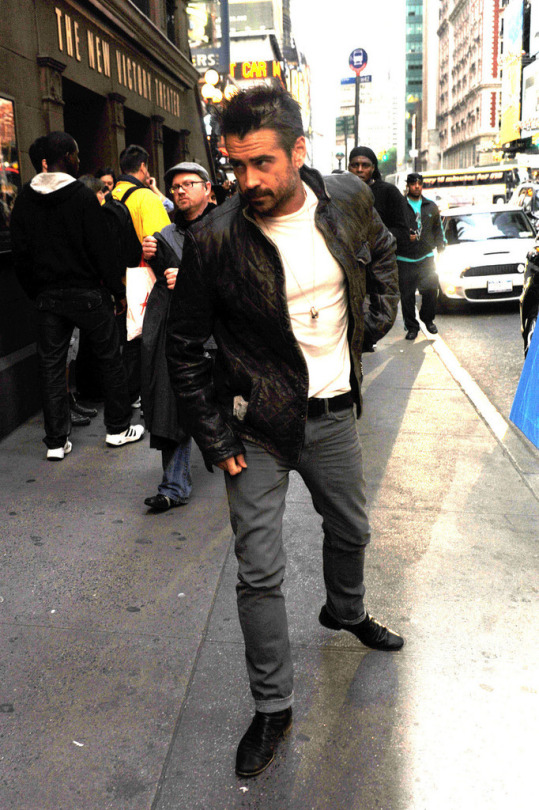
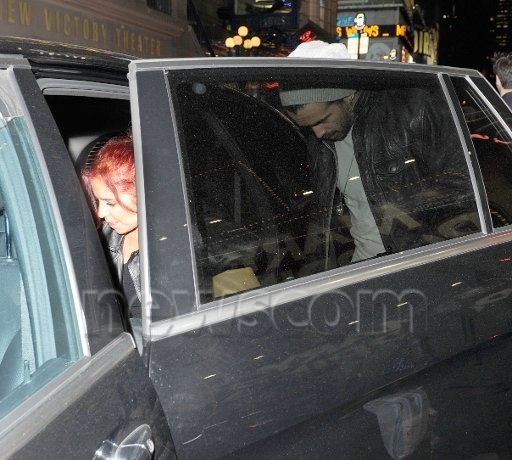



#jared leto#farrelleto#alexander 2004#Colin Farrell/Jared Leto#alexander (2004)#farrelleto meta#colin farrell
6 notes
·
View notes
Text
The Roger Moore Morally Compromised Mini-Marathon | Shout at the Devil (Hunt, 1976), Gold (Hunt, 1974) & The Wild Geese (McLaglen, 1978)

Mild spoilers below.
There's plenty you'll have to wince through when watching Shout at the Devil, which depicts the African continent as a playground for white adventurers, which relentlessly infantilizes its black characters while lingering over their dead bodies after they've been violently killed, which has as its most prominent African character a mute played by a white actor who is all too eager to hang villagers, and which has a character go undercover in blackface during the climax, as a cherry on top of a big ol' racist sundae. And this is not to mention that it asks us to root for an entirely self-interested ivory smuggler and features a poaching sequence so exuberant that the heroes are practically high-fiving each other as they kill a shitload of elephants. (Although a disclaimer assures us no animals were harmed during the making of the movie.) Unsurprisingly, the movie was produced in Apartheid era South Africa.
But I think Roger Ebert in his review, despite glossing over the film's issues, gets at its essence pretty succinctly, correctly noting that it's about the unironic embrace of jungle adventure movie with all its pleasures and idiosyncrasies. And if you can wince through all those aforementioned elements (and it's perfectly okay if you can't), you find much to enjoy here, starting with the team-up of Lee Marvin and Roger Moore, in incorrigible scoundrel mode and dashing but self-deprecating mode, respectively. Even the introduction of Barbara Parkins as Marvin's daughter and Moore's love interest doesn't sink the film, as Parkins is able to complement both of their performances pretty nicely and give the movie a bit of heart. Everybody knows all girls have cooties, but Parkins and the movie take measures to mitigate their spread.
There's also the fact that Peter Hunt, who directed one of the best Bond movies and edited a few others of similar pedigree, is a really good action director. There's one great scene where the heroes ambush a German convoy going down a hill, and the sense of diagonal movement snowballs, powered by both the astute editing and the unexpectedly gruesome violence, which, along with all the dicier elements, makes this feel like an exploitation movie despite the A-grade production values.
Compared to Shout at the Devil, Gold, an earlier collaboration between Peter Hunt and Roger Moore is maybe a bit easier to get through, in that it offers some semblance of self critique for choosing to film in Apartheid South Africa. Here, the gold mining industry is depicted as a purely amoral enterprise, the kind that is happy to kill off its own employees for short term gain, or, you could infer, maybe do business with a repressive regime. And it shows at least nominal sympathy for its black characters (and treats them as actual characters). A lot of the movie is about traversing through corporate politics, which I probably find more interesting to watch than the average viewer (a bizarre side effect of being a business major), although it must be said that Moore has great chemistry with his co-star Susannah York, and we get a pretty appealing performance from Ray "Dial M for Murder" Milland as the gruff patriarch. Hunt's talents as an editor are somewhat underused, but I like the way he presents the mine as one big machine, with a series of moving parts working in unison, all integral to its proper functioning. All that being said, the fate meted out to the villains feels like something from a dumber movie, and for some reason there's a Bond style theme song and opening credit sequence but with gold mining instead of racy silhouettes. (If you want more serious Moore, I'll recommend The Man Who Haunted Himself, which makes a pretty nice case for his acting talents and gives him some unexpected vulnerability. Also, he has a mustache.)
And of course I had to cap off my Roger Moore morally compromised mini-marathon with a rewatch of The Wild Geese, a movie that I've grown a real affection for, thanks to both familiarity, and the fact I'm a sucker for these old school men on a mission movies. Listen, the politics here are awful, and even more cringeworthy is the movie's attempt to hide it by pairing the deposed African president the heroes rescue with the most racist member of the group. Winston Ntshona and Hardy Kruger, the actors playing the president and the racist, respectively, both took their roles hoping for a serious movie about racism and African geopolitics. That seriousness did not materialize in the finished film, which resolves these issues with a quick conversation by the one hour thirty-two minute mark, at which point it can get back to shooting and blowing stuff up. For what it's worth, Ntshona and Kruger are actually committing to the material, and Kruger is especially good, although the movie plays its hand by allowing Kruger to articulate his mixture of racial resentment and isolationist views with unusual clarity while saddling Ntshona with vague platitudes. (And if you think racism is the movie's only questionable stance, it also relentlessly pokes fun at the one gay character, although it does eventually give him some good scenes.)
A bit easier to enjoy, perhaps at the movie's expense, are the presence of Richards Burton and Harris. I understand both of them were not allowed to drink during the production, and while I am not a good enough judge of alcoholism to tell if they look hungover from sneaking sips at night between shooting hours, or angry because they haven't been able to drink, there's an undeniable booze-adjacent contempt in their performances. (For what it's worth, Harris looks more cheerful, but I've found him the more innately energetic actor from experience.) The other big star is Moore, who gets by on his natural charisma but isn't as good as he is in Shout at the Devil or Gold or his Bond movies.
Honestly, for the first half, the movie seems to be rather badly made, shooting scenes in the most drab, limp way possible and resolving every confrontation with as few hiccups as possible. An attempt to rescue a character being hunted by the mafia ends with the mafia abruptly lifting all the contract put out on him. The siege on the base where the president is being held ends with no losses for the heroes, the guards all being sprayed with cyanide gas in their sleep or killed instantly with a crossbow. These characters are supposed to be highly trained professionals who can do this in their sleep, and that's basically how it plays, for better or worse. But complications do eventually arise, and the movie thankfully gets a lot more exciting. There's a half hour or so in the third act where the characters are retreating through the bush from a rapidly advancing army while trying to secure an exit, depicted as a near constant stream of close quarters gunfights and on-the-fly defensive tactics. As limp as Andrew V. McLaglen's direction is in the first half, he wisely gets out of his own way here, moving things along at a fast clip and letting the shooting, bleeding, dust and wilderness do the talking. (For something that feels tonally like a classic WWII era actioner, complete with rousing score, it's quite a bit bloodier than you'd expect.) It's a great action scene, and goes a long way in warming me up to this movie.
#film#movie review#shout at the devil#gold#the wild geese#peter r. hunt#andrew v. mclaglen#roger moore
2 notes
·
View notes
Link
0 notes
Text
a humble invitation to lose your mind about 《声入人心》 with me
finally getting around to a rec post for 《声入人心》 Sheng Ru Ren Xin / Super-Vocal because this lowkey might be the best show I’ve watched in the year of our eternal suffering 2021. yes, you heard me right, this variety show from 2018 is quite possibly my favorite television thing I’ve consumed all year
(rolls up sleeves) aight here we go—
what is 《声入人心》 / Super-Vocal, and what’s up with that title?
《声入人心》 is a 2018-19 Chinese variety show where they gathered a ludicrously talented cast of 36 classically-trained male singers and had them do ludicrously talented vocalist things for 12 whole episodes of musical virtuosity. nominally, the cast is competing for six 首席 shou xi / uhhh “finalist” seats, but lest that put you off, the first nine episodes feature absolutely zero elimination — they pit challengers from the remaining 30 against the top 6 each episode, and regularly re-shuffle the positions based on performance
the title is actually a delightful pun on the chengyu, 深入人心 shen ru ren xin / “to enter deeply into the hearts of people” (used to describe something of great influence and resonance) by swapping out the first character 深 shen / “deep” with 声 sheng / “sound” so the name of the show becomes something along the lines of “sound that reaches deep into your heart”
who knows where “Super-Vocal” came from, though I will concede that everyone involved in this show is pretty Super and there sure is Much Vocal happening
what sets this music-based variety show from other music-based variety shows?
good question! not one I’m particularly qualified to answer, considering that this is (checks notes) the first music-based variety show I’ve ever watched. 《声入人心》 focuses primarily on 美声 mei sheng / bel canto, which means most of their performances explore the spectrum of classical opera, operatic pop, musical theater, and folk songs (and sometimes Beyonce so tbh anything can happen, really). you’ll hear songs in Chinese, English, French, Italian, Spanish, and occasionally a multilingual mix of the above
the show also makes technical aspects of song and music theory accessible; little pop-ups will helpfully identify when key changes occur, and the performances steadily increase in difficulty as the participants move from duets to three-part and four-part harmony (good god the harmonies on these performances). I genuinely felt like I learned a lot about music and vocal performance just from watching this show, which is super exciting!
that’s all very well and good hunxi, but what about the people?
GLAD YOU ASKED because I love everyone in this bar. like, the music in this show is objectively spectacular but the heart of this show lies in the interactions between all the contestants, who are overwhelmingly supportive rather than competitive with each other (I personally find it hilarious how the editing attempts to generate Conflict and Tension but really everyone is extremely wholesome and encouraging and mutually appreciative of each other). everyone just loves music So Much
anyway, the contestants range from 19-year-olds who are still in college to their professors who have put out professional albums to singer-songwriters secretly running the pop music industry to independent up-and-coming musicians to stars of the Chinese musical theater scene, so there’s quite a nice spread of experience, vocal ranges, and musical styles
and because I, unsurprisingly, play favorites, I’d like to specifically shout out:
王晰 Wang Xi: this is in fact the man I won’t stop yelling about since his newest album 《B面图景》 just dropped; he has a baritone to make your knees go weak and a devastatingly dry wit capable of rendering even Ayanga speechless
周深 Zhou Shen: there is a dearth of him in the first few episodes but don’t fret! As soon as he gets the chance to sing everyone is immediately floored. This is still relatively early on in Zhou Shen’s career and outside of his musical comfort zone, so he’s actually quite shy and uncertain of himself until Wang Xi forcibly adopts him
阿云嘎 Ayanga: I made an entire separate post about this man and I don’t think it would be an exaggeration to call him the protagonist of this variety show. let’s just say that prior to this show I knew of him and after this show I would die for him
郑云龙 Zheng Yunlong: known as 音乐剧王子 “the prince of musical theater,” he definitively proves that he deserves that title throughout this show. One of the chillest chaos agents ever to grace a stage. Also he and Ayanga used to be roommates in college and I live for them dragging each other (okay it’s mostly Zheng Yunlong dragging Ayanga) every chance they get
honorary shout-outs to 蔡程昱, the goodest boy, 翟李朔天, for having The Most Flair All The Time, 方书剑, a literal sunshine puppy, 余笛老师, for a truly stunning range, and 简弘亦, who I maintain deserved far more screentime than he got, and look I can keep going but at this rate I’ll just go through all 36 of them so you should just watch the show and understand exactly why I’m like this now
can I get a sampler of the music so I can know what to expect?
absolutely! behold, recommendations based on any qualms or queries you might have:
“Operatic pop? What’s that?” Glad you asked, give "Grande Amore” a try, and if that doesn’t float your boat, I offer for your consideration “Melodramma” and “Les Rois du Monde”
"I mean, how good can the harmonies really get?” Get a load of Wang Xi, Ju Hongchuan, and Li Qi absolutely rocking these harmonies in “Sound of Silence”
“But I was promised musical theater?” and so you shall have it, here’s Zhou Shen singing “Memory” in two languages and Jia Fan, Cai Chengyu, and Ding Hui singing “Can You Feel the Love Tonight” in three part harmony, just because they can
“uhhh why are all of your recs not in Chinese? do they sing in Chinese at all?” yes they do, and they’re bangers
“Ayanga? 🥺” Ayanga <3. (also 双云 <3 <3 <3)
what else should I know going in?
hmmm, some housekeeping:
for reasons of copyright, some songs have been muted on the YouTube episodes; you can usually track down the performances by searching for the song/performers’ names + “声入人心 纯享版,” I only think there was one I had to go searching on bilibili for
the first two episodes are all 36 of the contestants performing a sample from their vocal range! don’t worry about remembering everyone; simply sit back and enjoy everyone mutually fanboying over everyone else’s talent
I think these have English subs on the YouTube videos! no idea how good they are, but they Sure Are There
ooooh keep an eye out for 马克 Mark, the pianist! he is a certified Legend
欢迎大家随我入坑 :)))))))
#hunxi does variety shows#I've been inspired by attilarrific come join me on my (very select) cvariety agenda#《声入人心》#Super-Vocal
61 notes
·
View notes
Text
Astaire & Rogers Rewatch Part 8: Carefree
• Ah Carefree. Another film with a lot of weird, extraneous crap in it that detracts from what we’re all actually here for: Astaire and Rogers together and dancing.
• Surprisingly, this odd movie has a song and dance I especially like, “Change Partners.” It also has the first on-screen romantic kiss between Astaire and Rogers. But we’ll get to that.
• Our character/actors: Dr. Tony Flagg (Fred Astaire), Amanda (Ginger Rogers), Stephen (Ralph Bellamy), Cora (Luella Gear)
• I’m not up on Ralph Bellamy’s filmography but in every movie I’ve ever seen him in, he’s the guy who loses the girl to the bigger male star.
• Now I’m no expert but it seems like if your fiancé breaks off your engagement three times, there might be some actual issues in your relationship. And I don’t think those issues boil down to just “the girl I like won’t marry me.”
• For the first time in one of these films, Astaire’s character isn’t a dancer or musician by profession. He’s a psychiatrist… who used to be a dancer. Gotta have some reason why he’s so dang elegant and talented.
Not a fan of his notes on a patient that indicate she’s a “typical pampered female” who doesn’t need a doctor but rather “a good spanking.”
Right after this, he describes Amanda, whom he hasn’t met, in very unflattering terms, including that she probably doesn’t have a brain. Here’s a diagnosis, Dr. Flagg. You’re a misogynist.
Already we can see some issues with Carefree. 1938 may have been a different time but nothing about Astaire’s character is charming, kind, or anything we’d want Rogers to be paired with.
• I do like that as usual Rogers’ character doesn’t stand for any crap. She doesn’t give one single eff about his questions or his attempts to chat with her and then she storms out.
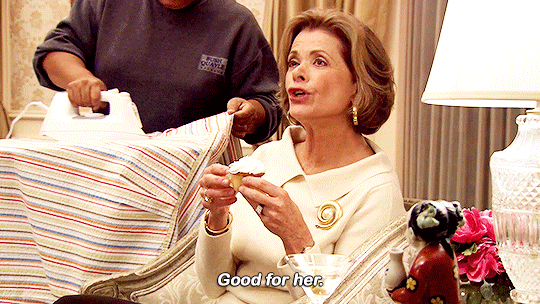
• Astaire spent two weeks rehearsing the golf solo (aka "Since They Turned 'Loch Lomond' into Swing"), during which he did a thousand swings. The actual number took two and a half days to film.
Surely it helped that he was an avid golfer already. In addition to horse racing, it was one of his favorites hobbies.
It goes without saying that he hits a golf ball better in the midst of a dance than I could on a driving range.
It also probably goes without saying that the only reason Tony does this number is because his ego is insulted by Amanda.

• Rogers looks particularly fab in her shorts during the bicycle scenes.
• Amanda begins to warm up to Tony after seeing he has talents besides psychoanalysis and insulting women he hasn’t met. But she only truly starts to like him after he makes an idiot of himself by crashing his bike into a bush.
• Cora thinks that Tony sent her a gigolo?? And she’s totally on board with it?? And she drinks something this random man (who we know is Tony’s assistant) hands her???
• “I Used to be Color Blind” has a lot of potential that it doesn’t live up to imo. As you might guess by the song and the way the scene is filmed, this sequence was supposed to be in color. But, depending on who you ask, either the studio felt it was too expensive or the color tests looked horrible so it was scrapped. Either way, it’s a shame. Audiences had to wait over ten years to see Astaire and Rogers dancing in color.
• I’m also not wild about the slow motion, which seems a bit goofy. However, it does let us better appreciate the talent and mastery of Astaire and Rogers. For example, when he lifts her in a spin, her feet don’t touch the ground again for a while and they both make it seem effortless.

• Soooo the Kiss. I know I’ve been banging the kiss kiss kiss drum for a few movies now. But this almost isn’t that satisfying? Now, I would say that this could’ve been intentional on Astaire’s part since he (and maybe his wife?) was the one opposed to any on-screen clinches and preferred the romance and intimacy to be in the dances. But, Astaire wasn’t comfortable with even this finished product, according to both his account and Rogers’. The slow-motion made what was really just a peck on the lips seem like much more, which he felt made up for all of the kisses he hadn’t given her in their previous films. So it seems unlikely he had any hand in intentionally making it unsatisfying.
More likely, it’s that of all of the scenes, songs, dances, and movies for a kiss to happen, this isn’t the one I would’ve picked. A peck on the lips during “The Continental” would’ve been perfect, or a delicate kiss after “Cheek to Cheek” or a passionate one after “Never Gonna Dance.” Just a few places I wish we’d seen a kiss rather than (or in addition to) here.
All of that said, I will say that there’s something very fitting that in the scene Rogers is the one to lean up and kiss him rather than him being the proactive one. That’s very fitting for their off-screen dynamic too where he was far more shy and reserved. And I do like that it’s clearly an intimate kiss, as evidenced by the way she wraps her arms around his back.
• Two years before she would win her historic Oscar, Hattie McDaniel appears in Carefree in an uncredited role as a maid.
• When Amanda next meets with Tony, she is conflicted about telling him about her dream where she was very clearly in love with him and not boring old Steve. Her sweater conveys her struggle. It has arrows piercing an embroidered heart over her actual heart.
• Amanda’s invented dream is insane but who hasn’t made up ridiculous excuses to stay around their crush? But kids, don’t go so far as being put under anesthesia.
• The whole period where Amanda is still drugged and acting weird is absolutely something I typically skip, even though Rogers does a good job with the slapstick.
• “The Yam” harkens back to previous numbers like “The Piccolino” or “The Continental.” Even though it feels almost a bit outdated at this point, it’s a fun, upbeat number in an otherwise somewhat dull film.
• I like that Astaire drops the acting after a few seconds. He’s just himself for most of this dance and looks like he’s having the most fun he has at any point in this movie. Rogers is also all smiles and looks marvelous.
• I also like that they dance around so much of the lodge and use much of the scenery as part of the number.
• Some fun lyrics:
“I didn’t come to do the Charleston” - Rogers got her start in entertainment by winning a Charleston contest when she was 14.
“I didn’t come to ball the jack” - Five years later, Judy Garland will perform a superb number called “Ballin’ the Jack” in For Me and My Gal with a promising new musical star: Gene Kelly.
• Gotta give it up for the EIGHT times they do the move where his leg is up on the table and she leaps over it.
• She is undoubtedly whispering something to him when they start to slow dance.
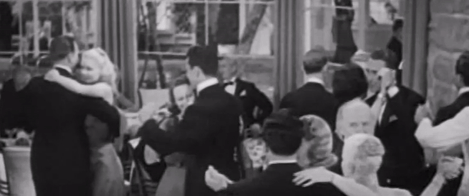
• Rogers is a really wonderful actress. She does a stellar job when Amanda tells Tony she’s actually in love with him.
• Look, I get that Tony’s trying to find a way out of a situation wherein his friend’s fiancé has fallen in love with him and plans to break it off with his friend, but telling Amanda she’s imagining her feelings is pretty crappy of him. Hypnotizing her so she’ll hate him and marry Steve instead is pretty stupid.
But once again, Rogers does a fab job in this scene. Hypnotized or not, she’s obviously devastated and cries even while pretending to be in a trance.
• “Kiss her, you dope!” is what I’ve been saying for seven movies.
• Some light gun violence humor here in 1938.
• I assume it’s an in-joke that the judge’s last name is Travers, which was the last name of Astaire’s character in Gay Divorcee.
• We already knew Steve was hapless trash but refusing to allow Amanda to choose her own future and instead leaving her hypnotized and getting a restraining order against his friend to prevent Tony and Amanda from ever getting together is a new low.
• Unsurprisingly, the most enduring song from this film is “Change Partners,” which was nominated for an Oscar. It’s also one of my favorites and frequently gets stuck in my head.
• At least Steve’s stupidity is used against him. Tony literally sings exactly what he’s going to do (“I’ll tell the waiter to tell him he’s wanted on the telephone”) and yet Steve still falls for it.

• For the third(?) time in this film, Rogers must pretend to be in a trance, this time dancing to Astaire’s hypnotic hands. But not long in, she clearly breaks through a bit because she becomes more of a participant. She grabs his hand when it’s on her waist and melts into his arms when they embrace.
• “Change Partners” as a dance is incredibly intimate. That’s not so unusual for Astaire and Rogers’ romantic duets but it’s a tad unusual in this particular film where, despite that kiss, they’ve hardly had any romantic interactions. And yet in this dance, they are frequently very close together, his lips hover near hers more than once, and it’s all very slow. In fact, they very nearly kiss a few times. To me it’s further proof that as long-awaited as the earlier kiss was, there were and are better places for it, such as right here.

• Amanda really gets a raw deal. Sure she gets to marry the man she actually loves. But in the process, she nearly shoots him and others, gets arrested, is subjected to a variety of psychological experiments, and then gets punched in the face on her wedding day.
• During this rewatch I’ve been surprised how much I’ve enjoyed certain films I don’t watch as much, like Gay Divorcee, but Carefree is pretty much how I remember it. Very little worth rewatching, except “The Yam” and “Change Partners.”
• Up next is the last RKO production Astaire and Rogers made and the end of their partnership… for now. It’s The Story of Vernon and Irene Castle.
26 notes
·
View notes
Note
35, whatever ship you want!
Hi @tinyarmedtrex 😊 ooh thanks so much! This, unsurprisingly, got away from me and became a lot bigger than I intended. Also unsurprisingly, I chose Reddie. Hope that’s okay. Enjoy!
35) An awkward kiss given after a first date:
I don’t know about you, but I’m feelin’ tiramisu
“Okay Rich, you think it over. Get back to me ASAP, though. Can’t keep HBO waiting,” Harry ‘Ace’ McIntyre grinned, clapping Richie Tozier hard on the shoulder as he stood up from the table.
“It was a pleasure, Eddie.”
Eddie Kaspbrak forced a smile onto his face.
“Back at ya, Harry.”
Steely, grey eyes flickered before a large, cold hand was covering his, squeezing tightly.
“Ace, Eddie please. Call me Ace.”
Eddie could feel Richie stifling a laugh (no doubt thinking about Ace Ventura, knowing him) from where he was practically plastered along his side, their thighs and shoulders pressed together as they sat at the restaurant table, staring up at the older man.
“Ace.”
The two friends watched for several beats as the tall, salt-and-pepper-haired executive turned on his heel and swanned out of the room towards the elevators.
“You think he bought it?”
Eddie tilted his head up at Richie, barely restraining his desire to roll his eyes.
“Hook, line and sinker, dude. Don’t think he was all too focussed on you anyway.”
Richie guffawed, taking a sip of his drink.
“I know, right? Who knew all I’d need to do to get him to stop relentlessly flirting with me was to bring you along to our business meeting?”
Eddie frowned at him, catching his eye, “Uh… you did, Rich. Isn’t that the whole reason you asked me in the first place?”
A beat passed. Two.
“Yeah, Eds,” Richie nodded, eyes lowering to the table, before draining his glass in one large gulp, “but your uh…your plan of pretending to be my boyfriend was the icing on the cake.”
He shrugged, gaze darting across the room to where Harry was entering the elevator, a smirk and small wave aimed their way as the doors closed.
“Still think it may just make ol’ Ace think he’s in for an Eds and Richie icecream sandwich, though.”
Eddie snorted into his own glass of chardonnay, side-eyeing the menu at his left elbow.
“No way I’d have a threesome with that Mark Harmon wannabe,” he grumbled along with his stomach, that took that moment to let out an embarrassingly loud growl.
Richie’s eyebrows shot up.
“Shit Eds, my bad. Forgot all you had was our liquid lunch. Let’s get some food into you before you start swooning like a Victorian maiden in the breeze.”
Eddie glared at him, elbowing him in the ribs.
“Don’t worry about my blood sugar, Trashmouth. You’re the one that eats like a hungover college student. Isn’t it about ramen o’clock for you?”
Which was how they ended up ordering actual dinner at the fancy hotel that Harry ‘Ace’ McIntyre insisted they stay at, overnight, all expenses paid on his company credit card. It was only mid-way through his smoked salmon that Eddie realised that Richie, at no point, made any move to leave his side and sit across from him.
Instead, he stayed practically attached at his hip, their elbows constantly bumping together as they reached for glasses and cutlery and eventually, the dessert menu.
“Hmm…tiramisu,” Richie muttered almost to himself, “the sexiest of desserts.”
Eddie stared at him.
“There are sexy desserts?”
Richie slowly lowered the menu, his already-large eyes practically bug-like as he gaped at Eddie.
“Uh, yeah Eds. Duh. Tiramasu, Death by Chocolate, Sex in a Pan, pretty much anything with strawberries—”
“Sex in a pan?”
Richie blinked.
“I saw it on Pinterest.”
“You’re on Pinterest?”
A flush crossed Richie’s cheeks as he clearly tried to backpedal, “Uh, some girl on Twitter sent me a link—”
“Don’t you have to have an account to see things on—”
“I don’t know about you, but I’m feelin’ tiramisu.”
Eddie chuckled, “Isn’t that a Taylor Swift song?”
Richie’s mouth dropped open, clearly pleased his joke landed.
“Eds! Did you just get a pop culture reference? Didn’t know you had it in ya, buddy.”
Richie was practically scarlet now, flushed with amusement, alcohol and something else. Eddie was kinda obsessed with the descent of crimson down his face, neck and disappearing into the open top button of his very nice navy shirt that Bev had forced him into earlier that day.
His gaze lingered on Richie’s bobbing Adam’s apple for a second too long, missing Richie’s response.
“What?”
Eddie forced his eyes back up to safer areas.
“I uh…I said we could just share something if you want?”
Eddie was doing a little better with his germaphobia these days. Being Richie’s roommate for the last year probably had something to do with it. If anything was gonna help ease him out of a lifetime of habitual, borderline-obsessive cleanliness was watching Richie eat a giant, meatball calzone with his bare hands on the white, cloth couch that Eddie had picked out when he first moved in. His heart had raced every time Richie groaned after each bite, but now that Eddie thought on it, that may not have been just because of the abundance of spaghetti sauce that threatened the integrity of their furniture.
Because really, Eddie had never shied away from sharing space with even the messiest Richie. From sharing anything with any version of Richie, really. Pop rockets, hammocks and now…tiramisu. Eddie didn’t know why Richie had always been the exception to his many, many rules regarding things like germs and personal space—
Except, he did. He knew well enough.
Which was how he wasn’t as grossed out as he should have been when both his and Richie’s spoons dipped into the dessert over and over again, clattering together until there was only one bite left.
Richie made a sweeping movement with his empty spoon, eyes twinkling.
“Have at it, Eds. I’m stuffed.”
It was when Eddie had the final spoonful raised to his lips did he realise how close their faces were and how Richie had yet to look away from him.
He closed his mouth around the spoon, his heart hammering in his chest as he watched Richie’s eyes follow the movement, his Adam’s apple bobbing again.
Warmth pooled into Eddie’s abdomen.
He could only imagine what this must look like to any outsiders looking in.
It looks like you’re on a date, genius.
It felt like he was on a date too, if he was being honest.
“‘S good,” he mumbled as he let the spoon fall back down into the bowl, trying to ignore his thumping heartbeat.
The noise of the spoon clanking against the dish seemed to startle Richie, he jerking slightly in his chair, blinking rapidly, staring down at the tablecloth that he was bunching in his hands.
“Y-Yeah, it was good. Uh…you uh…want another drink?”
Eddie stared at Richie’s whitening knuckles, his brain buzzing.
“Actually I’m kinda tired. Can we head upstairs?”
Upstairs to their shared room with only one bed because Eddie had had the bright idea of him pretending to be Richie’s boyfriend to get ‘Ace’ McIntyre to stop sniffing around him like a cat in heat.
That wasn’t the only reason though, was it Kaspbrak?
The sudden screech of Richie pushing out of his chair jolted Eddie out of his spiral.
“Sure Eds, sounds good.”
He dropped a hefty tip on the table before grabbing his suit jacket and draping it over his shoulder. Eddie watched as Richie’s chest and waist expanded and constricted with the motion, the tight material of his shirt leaving little to the imagination.
“Lead the way, Tozier.”
His voice was a lot more croaky than he would have liked as he swallowed around the dry lump in his throat, but he ignored it as he stood up and grabbed his own jacket, forcing his eyes to focus on the safe spot between Richie’s shoulder blades and not letting them drift lower while he followed him out of the restaurant towards the elevators.
They stood shoulder to shoulder, or in Eddie’s case, shoulder to upper arm, (Richie’s gangly height never failing to irritate him and…something else entirely sometimes) as Richie bounced on the balls of his feet, waiting for the doors to open.
“I’m proud of you, Rich.”
He didn’t plan on saying it, but did anyway.
Richie had come so far since he came out, live on stage last year. He had weathered the media storm post-coming-out, dealt with the backlash from shitty former-fans, opened up his home to Eddie who was freshly-divorced and recuperating from an actual-death-experience, written an emmy-nominated-and-favourite-to-win standup and was now working on developing his own comedy/drama for HBO alongside Bill.
Eddie was beyond proud of him.
He was just never the one good with words.
“Thanks, Eds.”
Their gazes met just as the elevator doors opened.
Judging by his misty eyes, Richie didn’t need much more than that from Eddie.
The ride up fifteen floors seemed to last forever and no time at all as they shared nothing but mingled breaths in the small space, their arms pressed against each other. Something thrummed in Eddie’s veins, an energy, a spark flooding his system with adrenaline as he felt on the precipice of something that they had been on for a long time. A knife-edge of potential with a seemingly endless drop.
It was terrifying.
And exhilarating.
And the most alive Eddie Kaspbrak had felt in a long, long time.
The doors opened with a jolt, snapping him from his reverie as he followed Richie down the hallway, fighting to catch his breath, not sure whether to curse the multiple glasses of wine he had or thank them. His eyes sought the strong line of Richie’s shoulder blades, biting his lip as he admired the expanse of Richie’s back as he walked.
They arrived at the door so abruptly that Eddie bumped up against that back, his face pressing into the shirt that smelled amazing. Something woodsy and sharp but not overwhelming. It was a smell he was familiar with, having shared a home with Richie all this time, but having it this close, this strong, was something else entirely.
“Whoa, where’s the fire Eds?” Richie joked, but sounded rather winded as he began shuffling, clearly looking for something as Eddie forced himself to right his footing, leaning away from him a little, but not much.
As Richie continued to struggle with his suit jacket, Eddie’s hand reached out almost unbeknownst to him to rest on Richie’s breast-pocket, fingers deftly reaching in and pulling out the keycard, holding it up pointedly.
“Looking for this?” he asked far too breathlessly as he took in just how close they were standing, crowded against the door in the dim-light of the hotel hallway.
“Uh…yeah,” Richie mumbled, expression enigmatic as he reached out to take the key, their hands brushing.
Eddie stares at their fingers, quiet words tumbling from his lips before he could stop them.
“You know, if this was a real date, this is probably where you’d kiss me goodnight.”
What the fuck, Kaspbrak?!
Richie gasped, eyebrows climbing up his forehead.
“Eds what—”
Eddie surged up, gripping the back of Richie’s neck and pulling him down, sealing his lips with his.
It wasn’t fireworks or explosions or any of Hollywood-esque bullshit.
It was…awkward. Mostly.
Mainly because Richie was frozen on the spot, one arm glued to his side, the other still clenching his hand and Eddie highly aware of a laser-focussed gaze zeroed in on them.
“Wow, someone is in for a fun night, huh boys?” a familiar voice asked, creepily smug.
Eddie pulled away, heaving a breath, his hand falling from Richie’s neck to grip the front of his shirt.
“Harr—Ace, uh sorry. Didn’t see ya there.”
He did, though.
Eddie had spotted him coming towards them just as the words ‘kiss me goodnight’ left his mouth and his tipsy brain decided that actually kissing Richie would be an okay cover for what the executive may have overheard.
“A-Ace,” Richie rasped, looking as shell-shocked as Eddie felt as he turned to the older man.
“Thanks again for e-everything. Looking forward to hearing from you. Goodnight!”
With that, he tugged Eddie’s hand toward the electric lock, clicking the door open and pulling Eddie haphazardly over the threshold, slamming the door behind them.
Eddie blinked up at him, their hands still joined.
“Uh, that was kinda rude, Rich—”
“If I didn’t drag your sexy little ass in here, he’d be following us, thanks to your… show,” Richie cut across him, eyes wild, his arms flailing, dropping Eddie’s hand like a stone.
Eddie covered his disappointment by raking it through his hair, not caring that it was likely sticking up in all angles now.
He was mid-swipe through his locks when Richie’s words caught up to him.
“Sexy?”
Richie’s attention snapped from the door back to him.
“Huh?”
Heat flooded Eddie’s cheeks as he cleared his throat.
“You uh…you called me sexy. Or, my ass anyway.”
Richie looked as if Eddie had just slapped him.
“Eds—I—that’s what you choose to focus on? Not the fact that an exec wants to engage in a little unholy trinity with us? Of course you’re fucking sexy, Eddie, are you kidding? You have to know tha—”
“Yeah, I really don’t,” he cut across him with his patented karate chop, insecurity beginning to creep into his veins.
What the fuck were you thinking, dumbass? It wasn’t a real date, you’re not real boyfr—
“You’re…you’re gorgeous Eddie, fuck.”
The words were wrenched from deep in Richie’s chest, as if it pained him to say them. His face, always full of a myriad of expressions, was no less of a silent story now.
It seemed like a whole other confession.
And maybe it was.
Warmth pooled in Eddie’s stomach as he stepped as he stepped closer and closer to Richie until his back hit the door.
It was up close like this that he could properly see just how affected Richie was after their little performance, his breath ragged, his skin flushed, his pupils dilated.
Holy shit.
“You…you’re sexy too by the way,” he admitted, his head spinning with the truth, “Bev is an angel for that suit, fuck Richie ,” he gasped, reaching out to clasp the collar of his shirt.
“I…I really wanna make a ‘buy a guy dinner first’ joke but uh…guess Ace has us beat,” Richie mumbled, looking awestruck as he slowly, tentatively ran his hand down Eddie’s forearm, feather-light.
“Pity he won’t reap the rewards,” Eddie tried to grin, failing to suppress a shiver as their skin met.
Richie leaned down until their mouths were barely an inch apart.
“And what rewards would that—”
Eddie shoved him back against the door with a thump, leaning up and crashing his lips against his.
This kiss was anything but awkward. It was fire and light and energy and…overwhelmingly right. Richie was ready for it this time, kissing back wholeheartedly, one hand clutching Eddie’s hip and the other winding around his back, pulling him flush against him.
Eddie groaned as Richie’s tongue brushed along the seam of his bottom lip, deepening the kiss and causing a bolt of arousal to shoot through him.
They broke for air, Eddie gasping against his lips, “J-Jesus Rich, you learn to kiss like that on Pinterest too?”
Richie laughed, his eyes still closed as he leaned down to rest his forehead against Eddie’s.
“Nah. Just a lot of articles on how to seduce your best friend and lifelong crush.”
Warmth spread throughout Eddie’s chest, his throat tightening with emotion.
I love you too, dumbass.
They had a lot to discuss. More words to exchange than either of them had the emotional capacity to communicate right now, so Eddie fell back on their routine. For now.
Tomorrow was another day.
“And what…what was the first step? Tiramisu?”
Richie’s eyes blinked open, shining bright in the semi-darkness.
“I told you, Eds. It is the sexiest dessert.”
Eddie chuckled, rolling his eyes as he pulled him back down.
“I’m not so sure. I can think of something sexier.”
Read on ao3 here
71 notes
·
View notes
Text
The 100: 7x08 Anaconda
The mini-rewatch of season 7 that @jeanie205 and me did during this mini-hiatus is finished, and with that, I’m going to finally post my reviews of 7x08 and 7x09, hopefully before the show returns.
I’m tempted to start talking about the opening scene without any introduction, just like the episode itself started with no “Previously on” and no cold open (the latter, I believe, for the first time since season 1, when the show still did not have any opening titles).. but I’m going to still say a few general things before going into details under the cut.
When it was first announced that an episode of The 100′s final season would be the backdoor pilot for a prequel show, that info was met with a lot of hostility (to the effect of “why waste a full episode on new characters instead of those we know”), which didn’t surprise me much. What did surprise me was that people mostly seemed to expect the episode to be 100% set in the past and unrelated to anything from season 7 - which, as far as I know, is not how backdoor pilots normally work, they still have to fit within the season they’re a part of. The structure of the episode is more in line with what I expected - while most of the episode is set in the past, the framing device is a scene of Clarke confronting Bill Cadogan in the Stone Room on Bardo, and the long flashback is both setting up a possible prequel, and revealing things relevant to the plot of season 7. The biggest connecting points are the Anomaly Stone on Earth, the importance of the Flame for Cadogan and the Disciples, and Cadogan himself, who is clearly not going to be a character in the prequel except possibly in flashbacks, but who is one of the main antagonists of season 7. The episode works as a backdoor pilot but is also interesting as a part of the backstory of The 100.
I really enjoyed the episode - and as it turns out, I enjoyed it even more on rewatch, when I could stop and soak in all the new info and details - and I hope the prequel does picked up, as it has a lot of potential to be interesting, though there is one big concern I have about it. More about that at the end of this post under “Prequel speculation”.
So no Previously on this time (unsurprisingly), no cold open - and we get a brand new version of the opening titles - since this episode technically fully takes place on Bardo, these opening titles start with the Bardo Stone Room and end with another shot of the Stone Room we haven’t seen before in the OT, one with the Stone. The Stone Room is where they begin and end, just like the episode itself. And just like Clarke and the rest of her group have been stuck in this Stone Room for 4 episodes.

But I actually don’t mind it in this episode. At least Clarke is in the focus of these few minutes we spend in the present, and I really like these few minutes. We start with an expanded version of Clarke's response to the news of Bellamy's "death", with slow motion, distorted angles and close-ups of Clarke’s face showing shock and grief and numbness (and I’m going to post another screenshot of that, because I want to savor the moments when the show focuses on characters’ grief before going back to the action - and not just the type of grief that results in going off the rails and murdering people.) We also see Raven on the verge of tears, and Miller choking a little - the other two people who have been Bellamy’s friends for a long time. Clarke being Clarke, she picks herself up the moment she sees someone else in pain (Raven) and focuses on honoring Bellamy’s memory, just as Bellamy did in 4x13 when he believed Clarke was dead, and tells Raven they need to save Octavia and Echo: “We do this for him. We do this for our family” - acknowledging that saving them is something of particular importance as they were people important to Bellamy, and also including them in the “family”, as the term these people use to describe their group and the bonds that have formed over time. (Family is bond closer and less close than friendship. You can be someone’s friend and their family, but you can also be a part of someone’s family without necessarily having developed a friendship with that person, due to the overall bonds and loyalty.)


Then we get the first meeting between Clarke and probably the season’s main antagonist, Bill Cadogan, who comes to another wrong conclusion when he thinks she recognized him because she has the Flame (and, he hopes, Callie’s memories), when it's actually from a video Jaha showed her.
Gabriel has another moment where he helps Clarke (as when he covered for her in 5x13) and silently communicates with her to let her know that the Disciples believe she still has the Flame, so she could keep up that pretense. These two work well as a team.
The bulk of the episode is the flashback framed as Bill telling a story to Clarke - though we don’t actually see the flashback from his POV, and he doesn’t even appear in many of the scenes. In fact, it is almost all from Callie’s POV, and some of it from Reese’s.
And we get back to Clarke and the Stone Room in the end, with the shocking “twist” of Clarke and the Nakara group seeing Octavia, Echo and Diyoza as Disciples. Shocking for them, not for us - we know they had no choice.
Clarke saying “You killed my best friend!” has caused some pointless (but in this fandom, expected) drama, where some fans saw that as “confirmation” that Bellarke is and will remain completely ‘platonic” - even though that makes no sense. What did anyone expect her to call him? My boyfriend? He wasn’t that. The man I love? My soulmate? Someone expected her to say that to an enemy she’s never met before, in front of a bunch of her friends and other people? Very unlikely, even if he hadn’t still been Echo’s boyfriend when he “died”. Some thought “Bellamy” or “him” would have been better, but what would that mean to Cadogan? He’s never met her and knows nothing about her, and she was trying to make it clear how much Bellamy meant to her. If anything, the fact that she’s singled him out as her best friend is a big progress from their usual habit of never defining their relationship to each other - except for Clarke including Bellamy in the collective designation of her “friends” or “family”.
I love the way the Chromatics cover of Neil Young’s “Into the Black” was used in the ending montage - so I made two gifsets about the use of the song for the Cadogan family scenes, and for the scene with Clarke:
https://travllingbunny.tumblr.com/post/623186143096307712/its-better-to-burn-out-than-to-fade-away-the
https://travllingbunny.tumblr.com/post/623186346138370048/its-better-to-burn-out-than-it-is-to-rust-the
Flashback
This is our second look at the world pre-apocalypse - after the brief scene of Josephine’s memory in 6x07, where we saw Josephine and her friend in the diner. But that scene took place several years before the apocalypse (depending on how much time was needed to get from Earth to Sanctum on Eligius 3, which did not have damaged engines as Eligius 4 did after the uprising), since Josephine and her family and the rest of Mission Team Alpha were already on Sanctum 7 years before the apocalypse. And Josephine and her friend were far less interested in the current events than Callie or August, so we only got a few outside references, including the magazine covers which showed that Diyoza’s capture was the main national news, and that Becca was already very high profile and on the cover of a technology/science magazine.
This, however, is the very day of the apocalypse. In the first scene - Callie Cadogan and her friend Lucy in Callie’s and her mother’s home, after participating in a protest as parts of environmentalist group with the familiar name Tree Crew - we get lots of info about just how crappy this world was even before ALIE started a nuclear apocalypse, through various news items on TV (see this post) - and it is like 2020, only taken to the 10th degree:
natural disasters as a result of global warming (a deathly heath wave is mentioned), new diseases (Coronavirus “Russian Ankovirus” outbreak), economic inequality (one of the news is that measures aimed at poverty relief haven’t met with support in Congress), internment camps in USA, anti-government protests in the USA that end up with riot police beating up protestors, together with technological developments, such as the first orbiting hotel (I wonder if anyone was already using it - if they were, there would be more survivors in space, but it doesn’t seem this ever became a part of the Ark), or the first brain transplant. a medical development which begs some ethical questions (since I’m pretty sure that a person with a functioning brain is still alive... I cant think of several different scenarios, disturbing to various degrees).
The world’s population has risen to 11 billion - I guess that’s why ALIE thought there were “too many people” (but her reasoning was as flawed as Thanos’ - instead of killing people, how about increasing or just better redistributing resources?).
It’s also confirmed that a Wallace was the POTUS at the time, meaning that the President and the administration went to the underground bunker at Mount Weather to survive the apocalypse (after which, as we know, they did the North Korean thing where they nominally live in a republic but their leaders are really hereditary).
Callie calls the US regime at the time “fascistic”, echoing how Diyoza characterized it in season 5.
Callie,her friend Lucy and August were all members of the environmentalist group Tree Crew (who already had the same symbol we later see Trikru the clan using), apparently declared illegal or terrorist or something by the Wallace administration.
Callie and Grace Cadogan also used to be members of the Second Dawn cult, led by her father Bill, together with her brother Reese. August also used to be a member. Possibly as a child of some other members.
Becca Franko - described as “tech tycoon” and “reclusive billionaire” - had not been seen in public for a year, since she went to her Polaris space station (to work on the Flame, as we know), a year after she created the first ALIE (and quickly realized ALIE had a fatal flaw). She also owned her own network.
One other piece of info about this world: they had holograms as a means of communication.
Something that was not in the news and not known to the public: it seems that quite a few people were “in the know” about the fact that a nuclear apocalypse may happen (whether they suspected it would be ALIE, or thought there would be a nuclear war) - and even had a code word for it, “Anaconda”. Bill Cadogan was one of the people who knew it. The POTUS and his administration obviously had enough time to evacuate. It’s mentioned that a lot of people immediately started trying to get to the bunkers.
Cadogan and Becca did not personally know each other before the apocalypse, but he apparently had “friends” in many of the space stations. This explains how she knew where the real Second Dawn bunker was located. But whoever these “friends” were, they clearly did not pass on that knowledge to the future generations on the Ark, since even Jaha, who researched Second Dawn, was only able to find public info - articles, Cadogan’s biography - and didn’t even know where the decoy bunker was, let alone the real one.
The most important thing the backdoor pilot needs to do, of course, is introduce compelling, interesting characters. It did pretty well in that regard - Callie is a likable protagonist, and the fact that the antagonists - Bill and Reese Cadogan - are her father and brother, gives more emotional resonance by putting family relationships at the center. The new characters have some similarities to the main characters from The 100, but are at the same time different enough.
The comparison between Callie and Clarke is the most obvious. Oddly enough, Jason tried to draw a difference between them by saying Callie is focused on saving “everyone” rather than “her people” - which makes me scratch my head, unless he means that Callie will always remain absolutely the same through the prequel show, since Clarke also started off by wanting to save everyone - and that was her driving motive for a long time, until the plot kept putting her in situations where she had to choose between her friends and family and strangers, where the latter would often be aggressors attacking her people. What strikes me as the biggest difference i- not just between Callie and Clarke but between all these prequel characters and the main characters of The 100 - is their background and the world they have grown up in. Clarke and Callie are both “princesses” - from the privileged background, but in Clarke’s case, it’s privileged relative to the majority of other people from the Ark, like the Blakes or Raven (which meant things like, nicer living quarters, opportunity to watch recordings of old soccer matches as entertainment, probably less worry about not getting the medicine you need), but in comparison with the way the most of the viewers live... definitely not. The world Clarke was born in is a post-apocalyptic world of scarce resources and constant fight for survival, and even her happy (by those standards)’ life in that world ends a year before the Pilot, when her father is executed and she has spent a year in solitary confinement, expecting to be executed herself - before she’ and 99 teenagers are sent to Earth as “expendable”. On the other hand, Callie, Reese, August, Tristan and others grew up in a world similar to our own. There are, of course, many people in our world who also have to fight for their own day-to-day survival every day, but the Cadogans are rich, and the rest of the Second Dawn members and their families are no doubt not far off. This is Callie’s house:
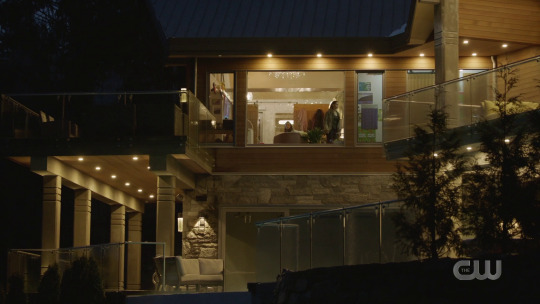
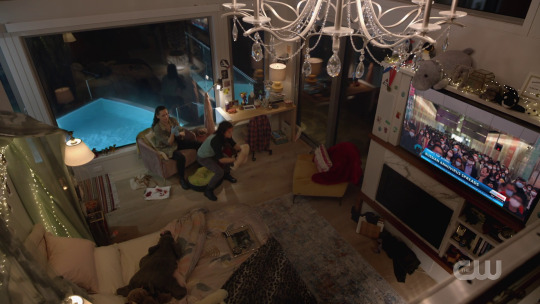
Some of these middle-class and upper middle-class kids are rebellious, idealistic and optimistic and worry about the fate of the world, like Callie, Lucy and August. On the other hand, there’s Reese, whose driving motivation is to impress his father and gain his love. He’s a rich boy with daddy issues, but he’s also a victim of emotional abuse - maybe physical, too (if we take into account a cut scene showing a training session where his father injures him, under the explanation of making him tougher or whatever). Callie and Reese are only the second sibling dynamic we see explored on the show (I’m not counting Emori and Otan, since the latter appeared very shortly), and this dynamic - a sibling rivalry between a rebellious girl who is her father’s favorite even while she opposes and rejects him, and her jealous brother who wants to impress his father - is completely different from the Blakes. (It reminds me a bit of Gamora amd Nebula - and I’ve just realized this is the second time in this review I’ve referenced MCU.)
Watching this family dynamic, I was reminded of another family that paralleled and contrasted the Griffins: the Lightbournes. Particularly when Grace called Bill a narcissist with psychopathic tendencies and he was entertained by that, In the flashback in 6x02. Simone called Russell a megalomaniac - but that was really said as a cute joke, as the Lightbournes were happily married, and Simone was just as bad as Russell, and even more ruthless than him. But in both cases, we have destructive rich white guy megalomaniacs who made themselves into gods, and want to bring back their dead daughters. Daughters are both extremely intelligent, brilliant and charismatic, but completely different in personality. (The mothers, while all very different, seem all to have been medical professionals - I’m not sure about Grace, but Callie does mention learning how to stitch a wound from her.) Callie sees that her father is an a-hole and rejects his values, and is an idealist and altruist who wants to do the right thing and save people (while Josephine was a selfish narcissist). Her mother Grace is somewhere in between, as she also left Second Dawn and doesn’t fully agree with Bill - but will often go along with him, and tries to keep peace between the other family members, and thinks their family needs to “set an example”. With the Griffins, we had an idealistic, altruistic father and a daughter with similar characteristics, who adored him and misses him after losing him, and a mother who was similarly concerned with helping others, and the conflicts between them were about how to go about these solutions. With the Lightbourne, we had the evil version of the Griffins, and the Cadogans have a more complicated dynamic. Callie is more comparable to Clarke, and Bill to Russell.
But one aspect in which Bill Cadogan is much worse than Russell is - where Russell loved his family, maybe a bit too much, considering what he did to bring them back, Bill loves himself and his “savior” role more than anything. Maybe his love for Callie comes close - and I get the impression that one of the main reasons he loves her is because he respects her and she challenges him - but it is still not his main motive. He is ready to punish his ex-wife for disobeying him by leaving her to die. Reese is an a-hole, but it’s hard not to feel sorry for him when he thinks for a moment that his father is worried for him (when Bill runs up to Reese, who's injured) but Bill immediately shows that all he cares about is getting the Flame, so he can get the final code for the Anomaly.
Another issue is, of course, that Callie, Reese and Grace are POC, but I don’t know if race - or sexuality, or gender - will ever be raised as an issue on the prequel show itself - or if the world pre-apocalypse and right after it is supposed to be as post-race, post-sexuality, post-gender as the current timeline of The 100 is. On The 100, for instance, Thelonius and Wells Jaha being black or Clarke being bisexual or a woman, were not issues that affected their status - only class issues existed; if the pre-apocalypse society was different, then the show could explore Callie, Reese and Grace being very privileged in terms of class and status in SD as Cadogan’s family, and lack of privilege in other respects.
I’m not sure I fully buy the way Callie easily goes along with her mother and leaves her best friend to die. It seems to go against the rest of her characterization. But maybe it shows that she still wasn’t a full-blown rebel at this point, in spite of participating in the protests against the government and in spite of rebelling against her father - maybe she still wasn’t able to really rebel against her mother, too.
Interesting line - as Callie stitches Lucy's injuries, Lucy says: "I don't want to be scarred for life" - which may be foreshadowing for Callie being scarred and haunted by the fact she left Lucy to die? Unless Lucy turns out to somehow be alive - but worse for wear. Which would again haunt Callie, too.
I guess Callie’s failure to at least try harder is supposed to be what drives her to try and save other people, after she learns that there was still room and resources for almost 100 more people in the bunker - and when she sees August fighting tooth and nail to save his girlfriend, when she is barred from the bunker because she’s not “Level 12″. August is clearly a character the show is setting us up to like - these scenes are reminiscent of Bellamy fighting to open the door for his sister, and his name evokes the Blakes (Octavia was named after Octavian August’s sister)..
(Sidenote: Callie mentions a high suicide rate (20 suicides in the last 6 months, twice as many attempts) - and this is something that would realistically happen in such a dire situation. It’s a bit unrealistic that it apparently never happened with Wonkru.)
The SciFi plot points relevant to the overall plot make an appearance when we see the Anomaly Stone on Earth, which Bill found in Machu Picchu and brought to the bunker (and we get an explanation why he didn’t use it right after the apocalypse but spent two years in the bunker instead - he didn’t know how to activate it - not being able to find the last two symbols)... and when, two years later, Becca Franko arrives from Polaris in her pod, as we saw in 3x07, with Nightblood as the cure against radiation she’s about to offer everyone, and the Flame in her head.
A few words about how I feel about Becca. While she is here positioned in opposition to Bill Cadogan - who is definitely a megalomaniac a-hole and a villain - I can’t see her as a pure unambiguous and unproblematic good guy we should stan, as Callie stans her. For starters, Becca is also a megalomaniac - she calls her second AI “the Flame”, comparing herself to Prometheus! (But she makes me think of Dr Frankenstein, and the full title of Mary Shelley’s novel was Frankenstein or the Modern Prometheus.) She is, of course, as a genius scientist, a lot more capable and competent than Cadogan,but she also has a huge savior complex (only she is focused on the idea of her AI being the savior, rather than herself), and is also another big capitalist - a “tech tycoon” who owns her own space station and her own network (and was so powerful and politically relevant that the Chinese and the Russian space station were refusing to join the rest of the stations until the US station destroyed Polaris - Becca was apparently seen as a rival strong enough to challenge the US government?). She worked for a big corporation (Eligius) which colonized other planets and used people - prisoners - as “expendable” work force that can be left to die if necessary. And knowing that she had Nightblood developed more than 7 years before the apocalypse, and that she was worried about what ALIE could do - I wonder why she didn’t offer Nightblood as the solution for a potential apocalypse before it happened, rather than isolating herself on Polaris to work on the Flame. That was one questionable decision - another one was putting the people on Polaris in danger and letting them die, so she could get the Flame to Earth. I could be more understanding of this decision if I could embrace the idea of the Flame as more important than anything, the one thing needed to save the world, as Becca believed it was. But her idea of a sole savior who will help everyone after being enhanced through an AI is something I find pretty questionable and a bit disturbing in general. To be fair the Flame definitely did fulfill its role once and help a person with a good mind use it to save the world - Clarke in season 3. But that was one time, to save the world from ALIE. This, however, doesn’t really justify passing the Flame on and on and giving people political power with it - even without knowing how distorted her initial idea would become in the Grounder society, surely anyone can see the potential for tyranny there? And Becca was aware that 1) the Flame could also make a bad person become even worse and powerful (as it has with Sheidheda) and 2) someone like Bill could use it to destroy the world, according to Becca herself. Seems like a way too big a risk to take.
There are apparently 744 different Anomaly symbols, which means an “infinite” number of combinations, according to Becca (err, not really; it’s a really, really huge number, but it’s not “infinite”, which bugged me a little, since I wouldn’t expect a scientist, especially one who uses the Infinity symbol as her logo, to use the word “infinity” as an exaggeration).
Becca manages to activate the Stone, not because of any scientific knowledge she has, but because the Flame, apparently, gives her enhanced hearing - allowing her to hear the sounds of the Stone, where each sound stands for a symbol. (Dogs can apparently also hear those rather unpleasant sounds.) Everything in this episode makes it clear that it is the Flame itself that Bill needs to find the code, it's always been about that. (Him thinking Callie is in there is just a bonus - emotional connection.) The Flame had no one's memories/spirit in this episode before Becca died, and Becca made it clear to Callie that it’s all about the Flame itself. If the Disciples knew Clarke didn’t have the Flame anymore, they wouldn’t need Madi or Sheidheda - it’s not about the memories, not even Becca’s., it’s that piece of plastic that's buried on Sanctum, if it can still work. (Or maybe they need Picasso :p.)
The most mysterious moment and the biggest question of the episode is - where (when?) did Becca go and what did she see when she activated the Stone the second time and when she and Callie saw the white light coming from the Anomaly? This is different from the green light we see when the Anomaly takes you to other planets. The white light is probably connected to transcendence and/or the Judgment Day that Becca said she saw - which Cadogan, with his typical arrogance, believes he is ready for. but Becca believes no one is.
"It wasn't to open the bridge to another world, it was to remake this one" - this line would make me think that our protagonists are meant to rebuild the Earth - but at this point, I find it hard to see how this could happen over in just 7 episodes, with how the current storylines are going. So maybe they’ll focus on rebuilding Sanctum, after all.
For opposing Bill’s plans, Becca is locked up for 5 days, tied to a pipe (geez!) and, guessing what’s about to happen, she explains the Flame to Callie and tells her to take it and never allow Cadogan to have it, as she believes he could destroy the world with it. (Another often asked question was how the Flame survived Becca’s burning - we learn that it can and that it’s programmed to save itself.)
Becca is burned by Second Dawn Disciples led by Reese Cadogan, presumably at his dad’s orders. Which maybe was supposed to evoke the popular idea of “burning a witch”, but the historical fact that burning at the stake was the traditional punishment for heresy fits even better. There’s been speculation that the memory we saw in 5x10 was his - but that’s incorrect: Madi experienced that memory, she felt being burned, screamed and yelled what Becca was yelling, and we saw it from her POV - the Second Dawn members that were around her and herself reflected in their helmets.
Another memory we saw from Madi, the one we saw her draw in 7x09 (and which I initially mistook seems to be a memory of Becca or other people going into the Anomaly) seems to actually be a memory of the moment when Becca first interacted with the Anomaly Stone and talked about it with the other people in the room - Bill, Grace, Callie and Reese. In other words, every one of the Flame memories from this period may be Becca’s - we have no evidence that would help us learn who else took the Flame after her death. It could be any of the characters who stayed on Earth - Bill is the only one who definitely has never gotten his hands on it.
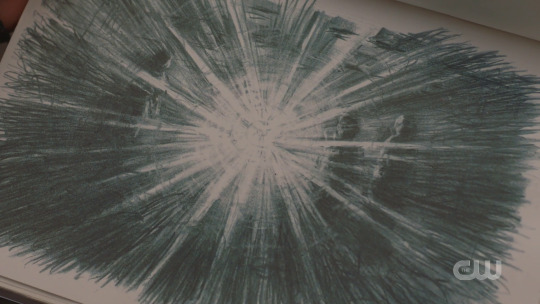
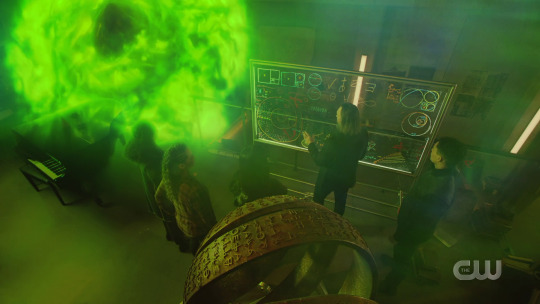
Retcons and Easter Eggs
I’ve always thought that the world-building, especially when it comes to the Grounder society and culture, was the weakest part of the show. Jason obviously followed some of the common tropes of post-apocalyptic fiction when it comes to the portrayal of Grounders, but didn’t think things through - and at some point, probably realized and/or heard/read all the criticism of the show and thought: “This really doesn’t make any sense”, came up with the Second Dawn backstory, and eventually came up with this expanded backstory, which gives many new explanations. Even though we still don’t have the answer to the biggest question: how a society made of bunch of modern people, survivors, could deteriorate into a tribal society with a medieval level of technological development and lack of knowledge about science and the past culture and history - over a few decades. I guess we need to see the prequel for that, but there are some ideas how it could have happened. I liked most of the retcons in this episode, such as:
Trigedaslang was devised by Callie as a child. The idea of a new language developing naturally over less than 100 years never made sense. (The “it’s a pidgin” explanation never worked either - as Trig apparently developed without the influence of any other language or necessity to communicate with people who don’t speak English. It’s just distorted/changed English.) The only reasonable explanation was always that it was an artificial language - we just didn’t know when it was made.
Finally we get an explanation about the fact that Grounders originated from the Second Dawn survivors and were influenced by their mottoes (”From the ashes, we will rise”), but at the same time, worship Becca as “Pramheda” and make their leaders take the Flame - in spite of the fact that Cadogan and Becca were rivals and that the latter was burned by the Second Dawn members.
The fact that two factions already exist - Callie’s (adores Becca, wants to save as many people as possible by using Nightblood, clearly trusts in science) and Reese’s (Second Dawn true believer, burned Becca, needs the Flame for other purposes) may start to explain how things started going wrong and the society fractured.
Speaking of which, the Conclave seems to have originated from Reese Cadogan’s obsession with the fights his father made him have with him and his sister, and his dumbass idea of using a duel to determine who gets the Flame. This is a better explanation than “it is after an apocalypse, so they just started having death tournaments for reasons”. Callie, on the other hand, is much more pragmatic and doesn’t seem to care much about tournaments as a way to prove oneself - because she doesn’t need to, so she does the Indiana Jones/Harrison Ford thing and just pulls the gun and shoots him in the shoulder. One of my favorite moments in this episode.
“Tree Crew” gets the award as the least expected and funniest new piece of info/retcon, though that begs the question of how the other clans got their names. I’ve joked that Ice Nation were a group of ice hockey fans... but for all I know, maybe that’s true! :D Or maybe the “Trikru” name was later misinterpreted as something to do with living in the woods, so the other clans started having names like “Boat people” or “Shallow Valley people”.
August made up the term Nightblood.
"You must choose wisely" comes from something Becca said to Callie, about choosing the person to give the Flame to. Too bad that later Commanders didn’t know it meant “find the most qualified person” and instead got the weird idea that it meant making a bunch of kids fight each other and that one of them winning somehow means the dead Commander’s spirit “chose” their successor.
One thing that definitely makes a lot more sense now is the Grounder’s bizarre fashion sense, I can easily see a bunch of 21st century upper middle class/rich teenagers thinking it would be super cool to wear warpaint, tattoos and dreadlocks (even if you’re as white as the original Sheidheda), and some later Commander going: “I want to wear a crown! No, you know what would be cool? That thing Indian women wear on their foreheads? You know that thing? I could wear that!”
Easter Egg: Callie was reading Ovid’s “Metamorphosis” at home just before the news of the nuclear apocalypse came - the same book that Niylah gave as a gift to Octavia not long after they went into the bunker (5x02). And maybe it is literally the same book - they sure weren’t printing any new books and someone had to bring that book initially to the Second Dawn bunker during the first apocalypse. In 5x02, it was symbolic of Octavia’s transformation into Blodreina. Here, it may be symbolic of Callie becoming a leader, or the transformation of the entire society.
But some other retcons don’t work well:
The Flame’s abilities have been retconed so many times, but this is the first time we learn that it enhances the Commanders’ senses - which is a big plot point, as it allowed Becca to hear the sounds of the Stone. We have never heard about that before or seen any indication that Lexa or S5/6 Madi had any enhanced sight or Matt Murdock-like super-hearing.
So why was Becca called the Commander aka Heda? I don’t mean the fact that she was never one - Callie could have decided to call her the first Commander as an homage. But why that term? The flashback in 3x07 made it look like it was because Becca was wearing a suit with the word “Commander” (because she took the actual Commander’s suit before she left Polaris) - but since everyone knew who she was, why would that make them start calling her Commander?
Prequel speculation
There’s a lot of reasons why I’d like to see the prequel picked up. Firstly, because Callie is a likable and charismatic protagonist. Reese could be an interesting antagonist as he is her brother - and while he has been a grade A a-hole so far, there’s room there for character development, especially with his relationship with his sister, backstory of abuse by their father and the probability that he’ll understand at some point that he won’t be able to get the Flame to his dad even if he gets it. There’s also the fact that their mother will need saving at the start of the new show (if it gets picked up), and certainly a lot of other possibilities for family drama. And we’d probably also see Callie change and be faced with difficult and morally ambiguous situations that test her, much as we’ve seen with Clarke over the seasons.
Several other things mentioned by Jason in his interviews sound quite exciting:
Lost-style flashbacks to the characters’ lives pre-apocalypse: I’d love this. It would present a contrast before and after the apocalypse, and flesh out characters, and let us learn more about things like, what the Battle of San Francisco was, which wars was Diyoza in, more about Diyoza’s role as a freedom fighter/terrorist... can we get more Diyoza backstory?
the possibility of seeing the origins of the Ark and ancestors of our main characters like Clarke, Bellamy and Octavia (and we know we would see the ancestors of these characters, Jason mentioned that - the guy clearly does know what the fandom likes and wants), immediately doubled my interest. I just hope there’s a good idea how to do that without 1) the two stories looking completely disconnected (it seems this won’t be the case as Jason mentioned that Callie’s people will have to go to space to make more Nightblood and this will allow crossovers) and 2) with a good explanation how the people on the Ark, 97 years later, did not know about the survivors on the ground, about the Earth being survivable, or about the Nightblood, which had been used by Eligius years before. The line "Dad had friends on more than one space station. They already know we're here" also begs for an explanation.
on the ground, we’ll see Callie and co. looking for more survivors (after all, there were more bunkers and other shelters) and offering them Nightblood as a “cure” - which could lead to a lot of interesting situations (and potentially pretty current commentary, if there are people who refuse it)... On the other hand, this could also lead to some more moral dilemmas when they run out of the Nightblood shots (they have 2,000 at the moment, and again, Jason has indicated that they will run out of NB and will have to create more).
Some of the big questions include - who becomes the actual first Commander? How does the society develop from there? When and how is the Anomaly Stone deactivated on Earth, and where is it now? How does Becca’s knowledge eventually get lost? We’ve heard it’s because the data got corrupted/deteriorated over time, but it’s a little too convenient that even Madi still had Becca’s memories, but the scientific and technological all other knowledge was gone during the following 95 years.
I have some ideas how it could go. A lot of people (including, obviously, Bill himself in-universe) wonder if Callie became a Commander and would like to see her be the first Commander. But Callie is the first Flamekeeper, and I don’t see her going “I’m the best and most qualified person, I should have it”. This doesn’t preclude the possibility - she may finally take it for similar reasons Clarke did in season 3, because she has to in order to do something important and there are no other candidates around. But that would be too optimistic an option. Maybe Reese manages to get his hands on the Flame, but Callie or August or someone from her faction manages to disconnect the Stone so he wouldn’t be able to get it to Bill? Or maybe someone else - say, Tristan, who so far can be summed up as “that while guy a-hole who hangs out with Reese” - managed to get his hands on it and then make himself Commander? If people like Tristan or Reese become the Commander, that would work better in terms of explaining how things went so wrong with the Grounder society.
There have been speculations if these characters are ancestors of this or that character we know. Maybe Tristan is an ancestor of this Tristan from season 1 (the guy who was sent to ‘slaughter’ the 100 and was killed by Kane in 2x01)? People are often named after their grandparents, sometimes even after their parents, or celebrated ancestors - names can get passed on like that, and Tristan isn’t exactly the most common name. Or, if Tristan manages to become a Commander - that would make it a popular name.
In any case, the prequel needs to provide a convincing explanation how the society of these survivors and their descendants went from what we see in this episode to the Grounder society we know. But this is my big concern about the prequel - and it’s the problem that many prequels have: however they get there, we know how things turn out; we know it all somehow goes wrong, and that not only will the antagonist fail in their initial goal (getting the Flame to Bill), but the protagonist, Callie, will ultimately fail in her attempts to create a better society. Instead, the Grounder society will descend into tribalism, worship of violence, and constant wars between a bunch of clans, the Flame won’t be given to the person chosen as most qualified but will be fought over by a bunch of children selected on the basis of “special blood” (as Nightblood becomes rarer over time) and forced to kill each other, and most of Becca’s knowledge will be forgotten, as Grounders become technologically underdeveloped and unable to really defend themselves from the Mountain Men, who will learn about them in a few decades and start using them as blood supply.
On the other hand, knowing that the protagonists will fail and that everything will go wrong is often the case with prequels (e.g. regardless of their quality, Star Wars prequels were certainly watched by many people), or, for that matter, with some period dramas (e.g. Babylon Berlin, which I love - set in the Weimar Republic, which means that we know all the time while watching the show that things will go horribly wrong on the level of the society). Sometimes that sense of doom doesn’t turn me off as viewer and actually makes the story more compelling in a way. But that would certainly be a difference from The 100 - no matter how dark, we can still hope things will turn out well and a good solution will be found. Or maybe everything will go even worse. We don’t know how things turn out with the humanity in general. In this prequel, we would know.
Body count for this episode: in the present day, no one. in the flashbacks... over 10 billion people.
Rating: 9/10
#the 100#the 100 7x08#anaconda#the 100 backdoor pilot#the 100 prequel#callie cadogan#calliope cadogan#clarke griffin#bill cadogan#becca franko#reese cadogan#grace cadogan#becca pramheda#the anomaly
19 notes
·
View notes
Note
if an older bts song was released in present day in the western music world with the amount of exposure that dynamite got, what song would you want personally and what song do you think would chart/perform best?
holy shit. I love you for this ask because I HAVE given this a lot of thought. like a LOT. the other day I was talking with my friend about this and I was so worked up cause it was like "can you imagine if ANY of their other songs got the promotion that dynamite has?? they would be UNSTOPPABLE" and then i started crying cause I know that would never happen unless the song was in english too.
i have two answers, the biased one and the objective one which is perfect for the way you phrased the question, which ty for that!!
so the one I would PERSONALLY love the most is, unsurprisingly, Mic drop. a lot of people seem to forget Mic drop was their FIRST hot100 entrance, it did so without any promotion in the US and zero airplay, and the fandom was way smaller back then. charting projects didn't exist. and not only that, but it was a STABLE QUEEN. it charted in the hot100 for like, over a month. sure, it never passed the #70 place I think, but still. now imagine that, with this bigger fandom and all that fucking promo. Mic drop would be legendary. I'm talking tiktok type of fame. I'm talking talk shows, commercials, a fucking dance challenge going viral, multi platinum, oh god. western rappers would be sucking up to hoseok like "heyyyy bestie collab when 😘" jfldjgkglk I need a second. so yeah, Mic drop would be my personal choice BUT it would also perform particularly well.
and strategically, looking at their past title tracks, a song that would secure that #1 IF IT HAD BEEN PROMOTED RIGHTLY is Black swan. I was gonna go with an older one and say Blood sweat and tears but to be quite honest I'm not completely sure if it has what it takes to impact the US industry and go viral like dynamite. it was too experimental and frankly, ahead of its time. but Black swan is bsat reloaded. it's a finely produced song with a lot of innovative elements and to be honest it should've been the title track off mots7. if coronavirus hadn't happened, and they had continued to promote it and had the level of exposure dynamite had, I'm telling you right now without a doubt Black swan would have been nominated for a grammy. it's one of their most solid songs ever. it's artistry at its highest level.

3 notes
·
View notes
Photo
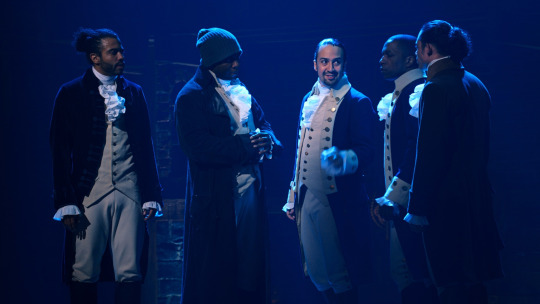
Satisfied?
We examine what Letterboxd reviews of Hamilton reveal about the musical’s cultural currency in 2020.
In this absolutely insane year, when our love of movies feels helpless in the face of pandemic-induced economic collapse, some extremely good decisions are being made on behalf of audiences. Studio Ghibli on streaming platforms. Virtual screenings to support art house cinemas. Free streaming of many important films about Black experience. And: Disney+ releasing the filmed version of Hamilton: An American Musical—recorded at the Richard Rodgers Theater in 2016 with most of its original Broadway cast—a year ahead of schedule, on Independence Day weekend.
“Superlative pop art,” writes Wesley of the filmed musical. “Hamilton wears its influences and themes on its sleeve, and it’s all the better for it. Lin-Manuel Miranda and his team employ an unlikely cocktail of not only hip-hop and showtunes, but also jazz (‘What’d I Miss?’), British-Invasion pop-rock (‘You’ll Be Back’), folk music (‘Dear Theodosia’) and Shakespeare (‘Take a Break’) in service of developing an impressively vast array of themes. This is a testament to the power of writing, an immigrant narrative, a cautionary tale about ambition, a tragic family drama, and a reevaluation of who decides the narrative of history.”
2016 may only be a half-decade ago, but it feels like an eon in American political years. With theaters dark and America’s long record of racism under urgent scrutiny, the complex smash-hit lands back in the spotlight at an interesting time. Is Hamilton “the most offensive cultural artefact of the last decade”, as Lee writes? Or “timeless and wholly of the moment”, as Tom suggests? The answer, according to a deep read of your Letterboxd reviews, is “all of the above”.
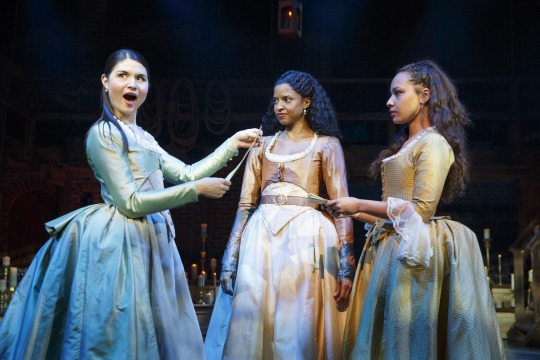
First things first: why now?
Sophie has a theory:
“Disney executive: Hey we’re losing a lot of money because our parks are closed. How do we start making money again?
Other Disney executive: It might be nice, it might be nice… to get Hamilton on our side.”
Sure, business. Still, it’s historically unprecedented that a Broadway show of this caliber (a record-setting sixteen Tony nominations, eleven wins, plus a Grammy and a Pulitzer) would be filmed and released to the public while it’s still, in a Covid-free universe, capable of filling theaters every night. Will people stay away when Broadway reopens because they’re all Disney+’d out?
No chance, reckons Erika. “I’d still kill to see Hamilton live with any cast… I get why producers are afraid that these videos might hurt ticket sales, but I’m fucking ready to buy a ticket and fly to NY one day just to see as many shows as I can after watching this.”
Not every musical fan has the resources to travel, often waiting years for a touring version to come near their hometown. And even if you do live in a town with Hamilton, the ticket price is beyond many; a daily lottery the only way some of us get to go. So Holly-Beth speaks for many when she writes: “I entered the Hamilton lottery every day for almost two years but I never got to be in the room where it happens… however, this 4K recording of the original cast will do very nicely for now! Finally getting to see the context and performances after obsessing over the music for years was so, so satisfying.”
“Finally” is a common theme. Sydnie writes, “I love this musical with every fiber of my body and it was an extraordinary experience finally getting to watch it in Australia”. Flogic: “To finally be able to put the intended visuals to a soundtrack that I’ve had on repeat for such a long time: goosebumps for 160 minutes.” Newt Potter: “Now I fully understand people’s love for this masterpiece of a musical!”
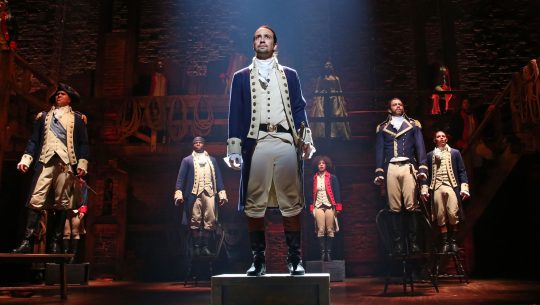
I’ve got a small query for you.
Where’s the motherfucking swearing? Unsurprisingly, Disney+ comes with some limitations. For Hamilton, it’s the loss of a perfectly placed F-word.
“I know Disney is ‘too pure’ to let a couple of ‘fucks’ slip by,” writes Fernando, “but come on, it’s kind of distracting having the sound go out completely when they sing the very satisfying ‘Southern Motherfucking Democratic Republicans!’ line.”
Will agrees: “Disney cutting ‘motherfucking’ from ‘Washington on Your Side’ felt like sacrilege akin to Mickey Mouse taking an eyebrow pencil to the Mona Lisa.”
Nevertheless, sings Allison:
“Even tho Disney stripped the story of its f***s,
Don’t think for a moment that it sucks.”
(Yes, she has a vegan alert for Hamilton.)
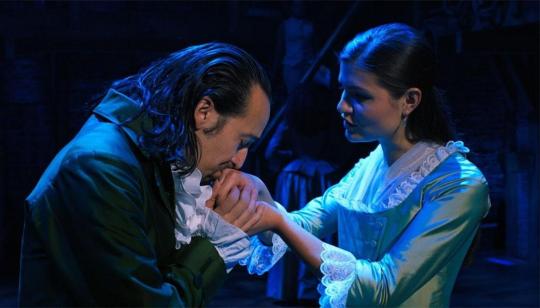
Does it throw away its shot?
The crew filmed two regular shows in front of live audiences, with additional audience-less sessions for a dolly, crane and Steadicam to capture specific numbers. The vast majority of you are satisfied. “It’s the most engaging and expertly crafted life filming I’ve seen since Stop Making Sense,” writes ArtPig. “The film does an incredible job of placing you right in the action. It feels like the best seat you could get in the theater. You can see the sweat and spit.”
“Translates perfectly onto the small screen,” agrees Ollie. “There’s a level of intimacy that feels hard to replicate in any other filmed production. We see those close ups, the passion and gusto behind every actor’s performance.”
“Shockingly cinematic for something filmed on such a small stage,” is Technerd’s succinct summary, while Paul praises director Thomas Kail: “He knows when to back away along with moving nearer when appropriate, and the choices always serve to govern the power and stamina of the performances.”
Though cast members’ voices were recorded on individual audio tracks, Noah had a few quibbles with the sound quality. “Some of the audio capture is off in the recording, sometimes voices being too soft or too loud. It’s not immersion breaking, but it is noticeable enough to irk me a little in pivotal moments. Some of the shot composition doesn’t fully work either. Of course nothing is going to be as good as seeing it in person.”
Robert, recalling another recent cinematic escapade of musical theater, lets his poetry do the talking:
“This will do for now until the true movie’s made,
Though if Hooper directs, there’ll be an angry tirade.”

I think your pants look hot.
Hamilton fans have their cast favorites, but something about being able to see Jonathan Groff’s spittle and Leslie Odom Jr’s scowls in 4K has you losing it all over again. Several specific shout-outs we enjoyed:
“Daveed Diggs the Legend! Go watch Blindspotting (2018), it’s one of the best movies ever!” —Kyle
“It’s hard to believe anyone will ever top Leslie Odom Jr. as Aaron Burr. I already loved him from the original cast recording, but seeing his full performance in all its glory was just godly.” —Erika
“Thankful that it was made possible for me to view with such clarity the phenomenon that is Renée Elise Goldsberry and spectacular Phillipa Soo.” —Thea
“Daveed Diggs was electrifying and Jonathan Groff was absolutely hilarious. If they interacted together the stage would’ve combusted from the sheer will of their talent.” —Nick
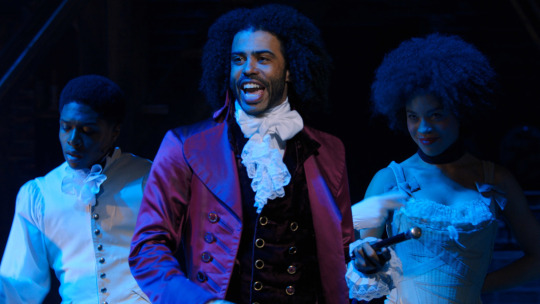
This is not a game.
On one hand, the release of Hamilton is sweet relief for music theater nerds riding out the pandemic. A generation of kids knows every word by heart, rapping (this version of) American history like it’s no thing. On the other, the Obama-era musical already feels behind-the-times, even for many Hamilton lovers, and the filmed version has brought that into sharp focus.
“I listened to the OG cast album about 50 times when it came out, the production is about as good as I’d always hoped,” writes Josh. “Since then however there’s been a very important and broader reckoning with the failures of neoliberalism and the Obama years ([from] which this has to be the most emblematic piece of art) and for me personally a drifting further to the left that has resulted in a very different relationship with the material. So my feelings today are a bit more complicated.”
“Hamilton is extremely non-committal about its politics,” writes Sting. “It doesn’t examine much of what Hamilton dictated besides ‘he wants complete financial control of the country’ (which would sound like a fucking supervillain in any other context, including reality).”
That lack of political commitment, reckons Morgan, is what helped Hamilton as a musical become so popular: “It’s fun. It’s catchy. It interweaves trendy and socially relevant artistic tools to infer a subversive subtext, while simultaneously sanitizing and, at times, flat out fabricating the historical narrative and downplaying the brutality of the true origin story, for the sake of appeasing those in power. Classic Bill Shakespeare stuff.”
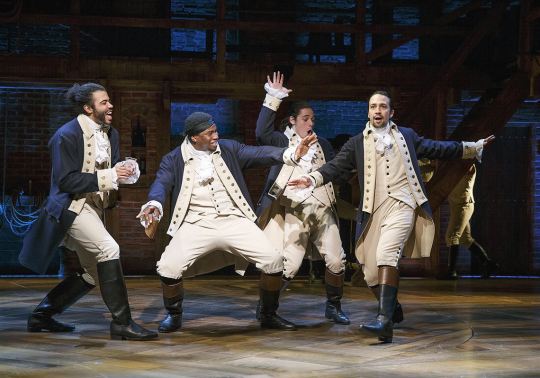
History has its eyes on you.
Much criticism lies with the fundamental storytelling decision to make a modern ruckus about America’s Founding Fathers, the men (including Alexander Hamilton) who in the late eighteenth century united the thirteen colonies and co-wrote the Constitution. Undisputed titans of history, they also have blood on their hands, and HoneyRose writes that the musical “glorifies these men, and paints them as self-sacrificing heroes, and honestly normalizes and validates slavery, as well as the behavior of slave owners.”
Stevie, who saw the Broadway production as well as the filmed version, confesses: “I’ve tried (I’ve really tried) to understand what makes people lose their minds over this but I’m still completely baffled by the hype… These were horrible men and a romanticism of them through song and dance just seems entirely misguided.”
Sean is not convinced that Hamilton is a hagiography. “I can’t imagine anyone watching all of this and thinking it paints a portrait of the Founding Fathers as anything other than childish, greedy, venal and self-aggrandizing.” Wesley agrees: “I don’t think Hamilton is trying to be a history lesson, so much as a lesson about how we think about history. It’s a compelling human story told in a revolutionary way.”
That “revolutionary way” is the musical’s central conceit: that of a cast-of-color playing the white founding fathers as they bumble towards independence. Journalist Jamelle Bouie, who regards the musical as “fun, exciting, innovative and, at points, genuinely moving,” wrestles with the “celebratory narrative in which the Framers are men to admire without reservation. Through its casting, it invites audiences of color to take ownership of that narrative, as if they should want to take ownership of a narrative that white-washes the history of the revolution under the guise of inclusion.”
It’s complicated for Matt, too: “It’s widely agreed upon that the show encapsulates the Obama era better than anything, how it coddles white liberals with a post-racial vision of history in a superficial sense, overlooking the insidious and oppressive systems that they benefit from (hearing the audience clap to ‘Immigrants, we get the job done’ unsettled me). Of course hopefully its legacy will be that it opened up more Broadway roles for POC. But I really think that the show doesn’t make Broadway more appealing and accessible to POC, it just makes hip hop more accessible to white people, a launching pad of course to listening to Watsky or something.
“No hate though to anyone that’s completely in love with this, it’s definitely worth seeing despite any hang ups.”
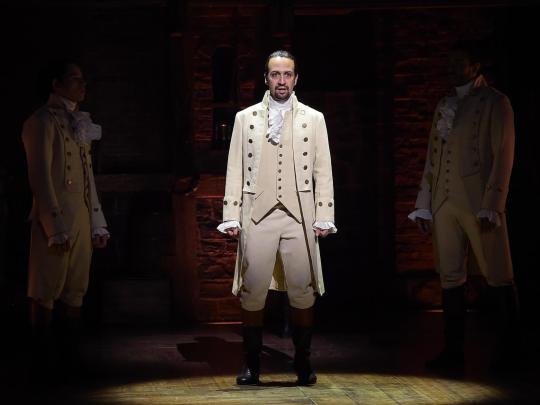
I wanna build something that’s gonna outlive me.
The story doesn’t end, just because the music does. Kai_Kenn has a suggestion: “I have been a part of discussions that dissect the culture that created Hamilton, as well as the culture that Hamilton created, and whether or not Hamilton appropriately addresses the modern issues [that] the cult following proposes it does.
“This is an ongoing discussion that I am trying to be an active listener in and, if you consider yourself to be a conscientious consumer of art, you should too.”
Noah is on board with that: “Reflecting on the past and focusing on the future are not two mutually exclusive actions. Both are a must, regardless of who you are or what you do. A five-star experience in a four-and-a-half-star film. I think that’s just fine.”
Related content
Want to see more of the key cast? Watch Daveed Diggs in ‘Blindspotting’; Renée Elise Goldsberry in ‘Waves’, Jonathan Groff repeat his role as Kristoff in ‘Frozen 2’, Lin-Manuel Miranda in ‘Mary Poppins Returns’, Leslie Odom Jr. in ‘Harriet’, Phillipa Soo in the forthcoming ‘Broken Hearts Gallery’, Christopher Jackson in the forthcoming ‘In The Heights’, Jasmine Cephas Jones in ‘The Photograph’, Okiereriete Onaodowan in ‘A Quiet Place II’ and Anthony Ramos in ‘Monsters and Men’ and ‘A Star is Born’.
Ways to support the Black Lives Matter movement
Official Black Lives Matter’s Resources
Teenagers that have ‘Hamilton’ stuff on their bedroom walls
Films where they mention ‘Hamilton’
#hamilton#hamilton an american musical#disney#disney plus#disney+#lin manuel miranda#leslie odom jr#daveed diggs#founding fathers#constitution#broadway#richard rodgers theatre#jonathan groff#letterboxd#renee elise goldsberry#phillipa soo#christopher jackson#musical theater edit#musical theatre#anthony ramos
6 notes
·
View notes
Text
Tagged by: @valenshawke, thanks dude!
Rules:
Answer the 11 questions you’ve been asked
Nominate 11 other bloggers
Ask your nominees 11 questions
Let them know you’ve nominated them!
What book or movie changed your view on how the world works?
Honestly? a whole slew of generic fantasy movies, but not for the reasons you’d think. My mother let me watch them at like, elementary-school age, but she also let me watch the special features and making-of’s first, and as dumb and corny as that sounds it really helped me as a kid realize that a lot of the evils and shit around aren’t necessarily huge unstoppable monsters. Everyone’s human, y’know?
I don’t watch a lot of movies I get most of my life-lessons from other media lmao
What’s your favorite fictional trope?
God, that’s a tough one. I don’t think I’ve really got a favourite but off the top of my head I’ll name “That thing where there’s one character is really badly injured but won’t accept any help until the other character’s like Listen Shut The Fuck Up And Let Me Heal You”, the equally-interesting counterpart of “Holy shit you’re injured you need help!” “Eh it’s not that bad it barely hurts tbh” or like, those types of characters who’ve done some bad, and understand that they need to atone but also kinda spiral a little too far into that until a character eventually has to be like “You! Don’t! Need! To! Die! For! Us!” and they just
... Oh either that or the Big Scary Guy Who’s Unabashedly Open And Loving With His Friends, that one is absolutely 100% among my absolute favourites
Why in the blue-hell did you join Tumblr?
I was curious about the memes lmao
What career did you want to have in high school and has that changed or stayed the same now?
Back in high school I wanted more than anything to be in a metal band with my friends, but I knew that since that’s not exactly a valid career path that I could try my hand at breaking into the animation industry as well. It’s stayed exactly the same. The only thing that’s changed is that the buddy I had who wanted to be a drummer in high school has totally bailed on me.
What was the first band you got wildly obsessed with?
Probably Children of Bodom tbh, I’m not sure if Dethklok counts since they’re not real but I got super into both of them around the same time lmao
What song do you love but are completely embarrassed by?
I oscillate wildly between not being embarrassed by any music I listen to because that’s just a part of who I am and being incredibly embarrassed for listening to anything at all. I’m not sure where I stand today
What’s a TV show you can or have re-watched multiple times and not get or have gotten sick of?
I’m not sure I have one, to be honest
What’s your favorite quote?
Don’t give up, Skeleton!
What’s the first video game you finished to completion?
Lego Batman 1 for the Nintendo DS was my shit. I 100%’d it back in the day.
My skills came in handy for 100%ing Lego Batman 2 when my sister decided she wanted to play every character in the game
What’s the weirdest conversation you’ve can think of having with someone?
A very serious and incredibly angry half-hour rant on centaur physiology which segwayed into centaur pregnancy and why a specific franchise I will never mention got it completely fucking wrong a friend of mine and I had. I think that’s the closest I’ve ever been to becoming a full-fledged mad scientist.
No, I absolutely refuse to elaborate. Please forget this has ever been mentioned.
OH I JUST REALIZED IT DOESN’T ASK THAT PAST TENSE
I dunno I’m pretty uncomfortable with a majority of NSFW topics for the most part so probably something in there lmao
What’s your most prized possession?
God at the risk of sounding like the most cliche musician trope ever, and unfortunately since I can never pick a single favorite, it’s probably my guitars. There is a reason for that though!
The three I have are a really crappy super cheap acoustic, the first guitar or indeed musical instrument I have ever owned, I’ve had it since I was a kid and despite it being in worse shape than I am, I love that thing.
I’ve also got a Not-An-Actual-Strat, or as I call it, The Electric Guitar That’s Nearly Everyone’s First, which holy shit if you’d have seen me back when I first got it we were nearly fuckin inseparable for months lmao. It was another gift from my dad, and I really love the thought behind it since he promised me he’d never buy me something like this until I had proved I’d earned it, or at the very least proved I’d been practicing, and I fuckin did. That and on the Christmas Day I’d opened it he got one too, which unsurprisingly lead to my first honest to goodness jam session, which was cool as hell
My last guitar, and the one I play the most is a Warlock, and I fucking LOVE that thing for not only how it sounds, feels, and looks, but also because it was the first guitar that I fuckin bought with my own goddamn money. I scraped and saved, I fuckin bled for this thing, and god damn if it wasn’t worth it.
... I’m sorry for the 4 paragraphs about guitars lmao, I’m uh, real enthusiastic about music lmao
I’ve got no idea what questions I’d write or people I’d tag, so I don’t think I can finish the rest of this though, sorry...
2 notes
·
View notes
Photo
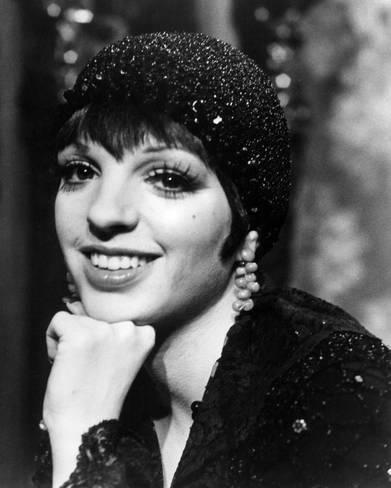
Famous Muses & Girlfriends in Filmmaking Pt. 22
GIRLFRIEND: Liza Minnelli (full name Liza May Minnelli)
Liza was born on March 12th, 1946, and was born and raised in Hollywood, CA to legendary singer-actress Judy Garland and Oscar winning movie director Vincente Minnelli. Her godparents are songwriter Ira Gershwin and vocal coach Kay Thompson. Thompson’s famous children’s series Eloise is said to be loosely based on Liza’s childhood. Like her mother, Liza instantly caught the musical theatre bug when she was a baby; and made her screen debut as a 2-year-old opposite Judy in In the Good Old Summertime (1949). While growing up, Liza was educated at Chadwick School in LA and later NYC’s High School of Performing Arts for her last three years of school. The same year she moved to NYC in 1961, Liza began her professional stage career as a chorus girl in a Cape Cod Melody Tent production of ‘Flower Drum Song.’ Two years later in 1963, she was cast as a lead in off-Broadway’s ‘Best Foot Forward,’ and performed with Judy at the London Palladium and on “The Judy Garland Show.” In 1965, Liza became the youngest actress (age 19) to ever win Best Actress at the Tony’s for ‘Flora, the Red Menace.’ She received two Oscar nominations for Best Actress with the romance drama The Sterile Cuckoo (1969) and the musical Cabaret (1972)—the latter for which she also won. The same year she was named Best Actress, Liza reteamed with her Cabaret director Bob Fosse for her 1972 Emmy award winning TV concert special, Liza with a ‘Z.’ After playing Dudley Moore’s love interest in the mega-hit comedy Arthur (1981), Liza’s popularity teetered a bit, but is now remembered as a musical legend. She also became familiar to cult TV fans with a recurring role on “Arrested Development” (2003-13). When Liza won Best Actress, she and her parents made Academy Award history as the first family to all have Oscars. Liza was also the leading lady in Vincente’s final film A Matter of Time (1976).
And just like her mother, Liza’s personal life is just as crazy as Judy’s. Not only did she get her own demons from drug abuse like Valium, cocaine and alcohol, but her love life was a mess too. Her first boyfriend was song-and-dance man turned character actor Christopher Walken (nice). They dated while starring together in ‘Best Foot Forward’ when he was 20 and she 17 in 1963-64. That same year Liza and Chris broke up, Liza started going out with her future first husband, pop musician Peter Allen. The couple later married on March 3rd, 1967, only to unsurprisingly get divorced in June 1974. In a 1996 interview with The Advocate, Liza stated, “I married Peter and he didn’t tell me he was gay. Everyone knew but me.” (Something else she has in common with Judy, LOL.) In between the separation and divorce, Liza casually dated Peter Sellers and Desi Arnaz, Jr. Only a couple months after the divorce, Liza went public with her relationship with film and TV producer Jack Haley, Jr. Amusingly, Liza’s mom Judy and Jack’s dad Jack Haley co-starred in The Wizard of Oz (1939) 35 years earlier. Liza and Jack Jr. married on September 15th, 1974, and would collaborate on the documentaries That’s Entertainment! (1974), That’s Dancing! (1985) and Minnelli on Minnelli (1987). Liza and her half-siblings Lorna and Joey Luft also participated in Jack’s TV special The Wonderful Wizard of Oz: 50 Years of Magic (1990).
Though the most normal marriage Liza ever had was with Jack, he was also unfortunately the guy she cheated on the most. After her career and stardom blew up with Cabaret, Liza began partying a lot more, became club buddies with Andy Warhol and Bianca Jagger, and had a handful of affairs. Her ~other men included Lucky Lady (1975) co-star Burt Reynolds, ballet dancer/actor Mikhail Baryshnikov and filmmaker Martin Scorsese. In his published diaries from the 1970s, Warhol remembered, “Liza’s life was very complicated now [1977]….She’d be walking down the street with Jack, then they’d run into Marty, whom she’s having an affair with, who in turn attacked her for having another affair with Mikhail. This was going on with her husband standing there!” Poor Jack. This all happened while Liza and Marty were working together on the extravagant period musical and eventual flop New York, New York (1977). Marty’s old friend Steven Prince even went as far as to claim Liza was also seeing co-star Robert De Niro on the side during filming (jeeeez).
In the same diaries, Warhol also famously reminisced on Liza once entering a showbiz party and exclaiming: “Gimme every drug you got.” The late 1970s to early ‘80s were a very dark time in her life until she successfully completed rehab in 1984. Her drug use was probably one of the reasons she struggled to conceive kids with Jack and had a couple miscarriages—one which caused a hiatal hernia (😬). After Jack and Liza officially divorced in April 1979, Liza went on to have two more (rather bizarre) marriages to stage manager Mark Gero and show promoter David Gest. Despite the messy infidelity, she and Jack did manage to stay friends until his death in 2001. Currently Liza’s sober, retired and enjoying being aunt to Lorna’s two kids.
#liza minnelli#girlfriends#jack haley jr.#jack haley jr#Martin Scorsese#liza is pretty idc#i feel so bad she never got to be a mom :/#musesandgroupiesseries
9 notes
·
View notes
Link
DURING THE POSTWAR PERIOD, the genres of the fantastic — especially science fiction — have been deeply intertwined with the genres of popular music, especially rock ’n’ roll. Both appeal to youthful audiences, and both make the familiar strange, seeking escape in enchantment and metamorphosis. As Steppenwolf sang in 1968: “Fantasy will set you free […] to the stars away from here.” Two recent books — one a nonfiction survey of 1970s pop music, the other a horror novel about heavy metal — explore this heady intermingling of rock and the fantastic.
As Jason Heller details in his new book Strange Stars: David Bowie, Pop Music, and the Decade Sci-Fi Exploded, the magic carpet rides of the youth counterculture encompassed both the amorphous yearnings of acid rock and the hard-edged visions of science fiction. In Heller’s account, virtually all the major rock icons — from Jimi Hendrix to David Crosby, from Pete Townshend to Ian Curtis — were avid SF fans; not only was their music strongly influenced by Heinlein, Clarke, Ballard, and other authors, but it also amounted to a significant body of popular SF in its own right. As Heller shows, many rock stars were aspiring SF writers, while established authors in the field sometimes wrote lyrics for popular bands, and a few became rockers themselves. British fantasist Michael Moorcock, for example, fronted an outfit called The Deep Fix while also penning songs for — and performing with — the space-rock group Hawkwind (once memorably described, by Motörhead’s Lemmy Kilmister, as “Star Trek with long hair and drugs”).
Heller’s book focuses on the “explosion” of SF music during the 1970s, with chapters chronicling, year by year, the exhilarating debut of fresh music subcultures — prog rock, glam rock, Krautrock, disco — and their saturation with themes of space/time travel, alien visitation, and futuristic (d)evolution. He writes, “’70s pop culture forged a special interface with the future.” Many of its key songs and albums “didn’t just contain sci-fi lyrics,” but they were “reflection[s] of sci-fi” themselves, “full of futuristic tones and the innovative manipulation of studio gadgetry” — such as the vocoder, with its robotic simulacrum of the human voice. Heller’s discussion moves from the hallucinatory utopianism of the late 1960s to the “cool, plastic futurism” of the early 1980s with intelligence and panache.
The dominant figure in Heller’s study is, unsurprisingly, David Bowie, the delirious career of whose space-age antihero, Major Tom, bookended the decade — from “Space Oddity” in 1969 to “Ashes to Ashes” in 1980. Bowie’s 1972 album The Rise and Fall of Ziggy Stardust and the Spiders from Mars was a full-blown SF extravaganza, its freaky starman representing “some new hybrid of thespian rocker and sci-fi myth,” but it had a lot of company during the decade. Heller insightfully analyzes a wide range of SF “concept albums,” from Jefferson Starship’s Blows Against the Empire (1970), the first rock record to be nominated for a Hugo Award, to Parliament’s Mothership Connection (1975), which “reprogramm[ed] funk in order to launch it into tomorrow,” to Gary Numan and Tubeway Army’s Replicas (1979), an album “steeped in the technological estrangement and psychological dystopianism of Dick and Ballard.”
Heller’s coverage of these peaks of achievement is interspersed with amusing asides on more minor, “novelty” phenomena, such as “the robot dance craze of the late ’60s and early ’70s,” and compelling analyses of obscure artists, such as French synthesizer wizard Richard Pinhas, who released (with his band Heldon) abrasive critiques of industrial society — for example, Electronique Guerilla (1974) — while pursuing a dissertation on science fiction under the direction of Gilles Deleuze at the Sorbonne. He also writes astutely about the impact of major SF films on the development of 1970s pop music: Monardo’s Star Wars and Other Galactic Funk (1977), for example, turned the cantina scene from Star Wars into a synth-pop dance-floor hit. At the same time, Heller is shrewdly alert to the historical importance of grassroots venues such as London’s UFO Club, which incubated the early dimensional fantasies of Pink Floyd and the off-the-wall protopunk effusions of the Deviants (whose frontman, Mick Farren, had a long career as an SF novelist and, in 1978, released an album with my favorite title ever: Vampires Stole My Lunch Money). Finally, Heller reconstructs some fascinating, but sadly abortive, collaborations — Theodore Sturgeon working to adapt Crosby, Stills & Nash’s “Wooden Ships” as a screenplay, Paul McCartney hiring Star Trek’s Gene Roddenberry to craft a story about Wings. In some alternative universe, these weird projects came to fruition.
Heller’s erudition is astonishing, but it can also be overwhelming, drowning the reader in a welter of minutiae about one-hit wonders and the career peregrinations of minor talents. In his acknowledgments, Heller thanks his editor for helping him convert “an encyclopedia” into “a story,” but judging from the format of the finished product, this transformation was not fully complete: penetrating analyses frequently peter out into rote listings of albums and bands. There is a capping discography, but it is not comprehensive and is, strangely, organized by song title rather than by artist. The index is similarly unhelpful, containing only the proper names of individuals; one has to know, for instance, who Edgar Froese or Ralf Hütter are in order to locate the relevant passages on Tangerine Dream and Kraftwerk, respectively.
That said, there is no gainsaying the magisterial authority displayed in assertions such as: “The first fully formed sci-fi funk song was ‘Escape from Planet Earth’ by a vocal quartet from Camden, New Jersey, called the Continental Four.” And who else has even heard of — much less listened to — oddments like 1977’s Machines, “the sole album by the mysterious electronic group known as Lem,” who “likely took their name from sci-fi author Stanislaw Lem of Solaris fame”? Anyone interested in either popular music or science fiction of the 1970s will find countless nuggets of sheer delight in Strange Stars, and avid fans, after perusing the volume, will probably go bankrupt hunting down rare vinyl on eBay.
While Heller’s main focus is the confluence of rock ’n’ roll and science fiction, he occasionally addresses the influence of popular fantasy on major music artists of the decade. Marc Bolan, of T. Rex fame, was, we learn, a huge fan of Tolkien and C. S. Lewis, while prog-rock stalwarts Yes and Emerson, Lake & Palmer managed “to combine science fiction and fantasy, fusing them into a metaphysical, post-hippie meditation on the nature of reality.” What’s missing from the book, however, is any serious discussion of the strain of occult and dark fantasy that ran through 1960s and ’70s rock, the shadows cast by Aleister Crowley and H. P. Lovecraft over Jimmy Page, John Lennon, Mick Jagger, and (yes) Bowie himself. After all, Jim Morrison’s muse was a Celtic high priestess named Patricia Kennealy who went on, following the death of her Lizard King, to a career as a popular fantasy author. Readers interested in this general topic should consult the idiosyncratic survey written by Gary Lachman, a member of Blondie, entitled Turn Off Your Mind: The Mystic Sixties and the Dark Side of the Age of Aquarius (2001).
Heller does comment, in passing, on an incipient musical form that would, during the 1980s, emerge as the dark-fantasy genre par excellence: heavy metal. Though metal was, as Heller states, “just beginning to awaken” in the 1970s, his book includes sharp analyses of major prototypes such as Black Sabbath’s Paranoid (1970), Blue Öyster Cult’s Tyranny and Mutation (1973), and the early efforts of Judas Priest and Iron Maiden. This was the technocratic lineage of heavy metal, the segment of the genre most closely aligned with science fiction, especially in its dystopian modes, and which would come to fruition, during the 1980s, in classic concept albums like Voivod’s Killing Technology (1987) and Queensrÿche’s Operation: Mindcrime (1988).
But the 1980s also saw the emergence of more fantasy-oriented strains, such as black, doom, and death metal, whose rise to dominance coincided with the sudden explosion in popularity of a fantastic genre that had, until that time, largely skulked in the shadow of SF and high fantasy: supernatural horror. Unsurprisingly, the decade saw a convergence of metal music and horror fiction that was akin to the 1970s fusion of rock and SF anatomized in Strange Stars. Here, as elsewhere, Black Sabbath was a pioneer, their self-titled 1970 debut offering a potent brew of pop paganism culled equally from low-budget Hammer films and the occult thrillers of Dennis Wheatley. By the mid-1980s, there were hundreds of bands — from Sweden’s Bathory to England’s Fields of the Nephilim to the pride of Tampa, Florida, Morbid Angel — who were offering similar fare. Lovecraft’s Cthulhu Mythos inspired songs by Metallica, Mercyful Fate, and countless other groups — including Necronomicon, a German thrash-metal outfit whose name references a fictional grimoire featured in several of the author’s stories.
By the same token, heavy metal music deeply influenced the burgeoning field of horror fiction. Several major 1980s texts treated this theme overtly: the doom-metal outfit in George R. R. Martin’s The Armageddon Rag (1983) is a twisted emanation of the worst impulses of the 1960s counterculture; the protagonist of Anne Rice’s The Vampire Lestat (1985) is a Gothic rocker whose performances articulate a pop mythology of glamorous undeath; and the mega-cult band in John Skipp and Craig Spector’s splatterpunk classic The Scream (1988) are literal hell-raisers, a Satanic incarnation of the most paranoid fantasies of Christian anti-rock zealots. The heady conjoining of hard rock with supernaturalism percolated down from these best sellers to the more ephemeral tomes that packed the drugstore racks during the decade, an outpouring of gory fodder affectionately surveyed in Grady Hendrix’s award-winning study Paperbacks from Hell: The Twisted History of ’70s and ’80s Horror Fiction (2017). Hendrix, himself a horror author of some note, has now published We Sold Our Souls (2018), the quintessential horror-metal novel for our times.
Hendrix has stated that, prior to embarking on this project, he was not “a natural metal fan”:
I was scared of serious metal when I was growing up. Slayer and Metallica intimidated me, and I was too unsophisticated to appreciate the fun of hair metal bands like Mötley Crüe and Twisted Sister, so I basically sucked. […] But I got really deep into metal while writing We Sold Our Souls and kind of fell in love.
The author’s immersion in — and fondness for — the genre is evident on every page of his new novel. Chapters are titled using the names of classic metal albums: “Countdown to Extinction” (Megadeth, 1992), “From Enslavement to Obliteration” (Napalm Death, 1988), “Twilight of the Gods” (Bathory, 1991), and so on. The effect is to summon a hallowed musical canon while at the same time evoking the story’s themes and imparting an emotional urgency to its events. These events also nostalgically echo 1980s rock-horror novels: like The Armageddon Rag, Hendrix’s plot chronicles the reunion of a cult outfit whose breakup decades before was enigmatically fraught; like The Scream, it features a demonic metal band that converts its worshipful fans into feral zombies; like The Vampire Lestat, it culminates in a phantasmagoric stadium concert that erupts into a brutal orgy of violence. Yet despite these pervasive allusions, the novel does not come across as mere pastiche: it has an energy and authenticity that make it feel quite original.
A large part of that originality lies in its protagonist. As the cock-rock genre par excellence, its blistering riffs and screeching solos steeped in adolescent testosterone, heavy metal has had very few notable female performers. But one of them, at least in Hendrix’s fictive history, was Kris Pulaski, lead guitarist of Dürt Würk, a legendary quintet from rural Pennsylvania that abruptly dissolved, under mysterious circumstances, in the late 1990s, just as they were poised for national fame. Kris was a scrappy bundle of nerves and talent, a kick-ass songwriter and a take-no-prisoners performer:
She had been punched in the mouth by a straight-edge vegan, had the toes of her Doc Martens kissed by too many boys to count, and been knocked unconscious after catching a boot beneath the chin from a stage diver who’d managed to do a flip into the crowd off the stage at Wally’s. She’d made the mezzanine bounce like a trampoline at Rumblestiltskins, the kids pogoing so hard flakes of paint rained down like hail.
But that was eons ago. As the story opens, she is staffing the night desk at a Best Western, burned out at 47, living in a broken-down house with her ailing mother and trying to ignore “the background hum of self-loathing that formed the backbeat of her life.” She hasn’t seen her bandmates in decades, since she drunkenly crashed their tour van and almost killed them all, and hasn’t picked up a guitar in almost as long, constrained by the terms of a draconian contract she signed with Dürt Würk’s former lead singer, Terry Hunt, who now controls the band’s backlist. While Kris has lapsed into brooding obscurity, Hunt has gone on to global success, headlining a “nu metal” outfit called Koffin (think Korn or Limp Bizkit) whose mainstream sound Kris despises: “It was all about branding, fan outreach, accessibility, spray-on attitude, moving crowds of white kids smoothly from the pit to your merch booth.” It was the exact opposite of genuine metal, which “tore the happy face off the world. It told the truth.”
To inject a hint of authenticity into Koffin’s rampant commodification, Hunt occasionally covers old Dürt Würk hits. But he avoids like the plague any songs from the band’s long-lost third album, Troglodyte, with their elaborate mythology of surveillance and domination:
[T]here is a hole in the center of the world, and inside that hole is Black Iron Mountain, an underground empire of caverns and lava seas, ruled over by the Blind King who sees everything with the help of his Hundred Handed Eye. At the root of the mountain is the Wheel. Troglodyte was chained to the Wheel along with millions of others, which they turned pointlessly in a circle, watched eternally by the Hundred Handed Eye.
Inspired by the arrival of a butterfly that proves the existence of a world beyond his bleak dungeon, Troglodyte ultimately revolts against Black Iron Mountain, overthrowing the Blind King and leading his fellow slaves into the light.
One might assume that Hunt avoids this album because the scenario it constructs can too readily be perceived as an allegory of liberation from the consumerist shackles of Koffin’s nu-metal pablum. That might be part of the reason, but Hunt’s main motivation is even more insidious: he fears Troglodyte because its eldritch tale is literally true — Koffin is a front for a shadowy supernatural agency that feeds on human souls, and Dürt Würk’s third album holds the key to unmasking and fighting it. This strange reality gradually dawns on Kris, and when Koffin announces plans for a massive series of concerts culminating in a “Hellstock” festival in the Nevada desert, she decides to combat its infernal designs with the only weapon she has: her music. Because “a song isn’t a commercial for an album. It isn’t a tool to build name awareness or reinforce your brand. A song is a bullet that can shatter your chains.”
This bizarre plot, like the concept albums by Mastodon or Iron Maiden it evokes, runs the risk of collapsing into grandiloquent absurdity if not carried off with true conviction. And this is Hendrix’s key achievement in the novel: he never condescends, never winks at the audience or tucks his tongue in cheek. Like the best heavy metal, We Sold Our Souls is scabrous and harrowing, its pop mythology fleshed out with vividly gruesome set pieces, as when Kris surprises the Blind King’s minions at their ghastly repast:
Its fingernails were black and it bent over Scottie, slobbering up the black foam that came boiling out of his mouth. Kris […] saw that the same thing was crouched over Bill, a starved mummy, maggot-white, its skin hanging in loose folds. A skin tag between its legs jutted from a gray pubic bush, bouncing obscenely like an engorged tick. […] Its gaze was old and cold and hungry and its chin dripped black foam like a beard. It sniffed the air and hissed, its bright yellow tongue vibrating, its gums a vivid red.
The irruption of these grisly horrors into an otherwise mundane milieu of strip malls and franchise restaurants and cookie-cutter apartments is handled brilliantly, on a par with the best of classic splatterpunk by the likes of Joe R. Lansdale or David J. Schow.
Hendrix also, like Stephen King, has a shrewd feel for true-to-life relationships, which adds a grounding of humanity to his cabalistic flights. Kris’s attempts to reconnect with her alienated bandmates — such as erstwhile drummer JD, a wannabe Viking berserker who has refashioned his mother’s basement into a “Metalhead Valhalla” — are poignantly handled, and the hesitant bond she develops with a young Koffin fan named Melanie has the convincing ring of post-feminist, intergenerational sisterhood. Throughout the novel, Hendrix tackles gender issues with an intrepid slyness, from Kris’s brawling tomboy efforts to fit into a male-dominated world to Melanie’s frustration with her lazy, lying, patronizing boyfriend, with whom she breaks up in hilarious fashion:
She screamed. She broke his housemate’s bong. She Frisbee-d the Shockwave [game] disc so hard it left a divot in the kitchen wall. She raged out of the house as his housemates came back from brunch.
“Dude,” they said to Greg as he jogged by them, “she is so on the rag.”
“Are we breaking up?” Greg asked, clueless, through her car window.
It took all her self-control not to back over him as she drove off.
Such scenes of believable banality compellingly anchor the novel’s febrile horrors, as do the passages of talk-radio blather interspersed between the chapters, which remind us that conspiratorial lunacy is always only a click of the AM dial away.
While obviously a bit of a throwback, We Sold Our Souls shows that the 1980s milieu of heavy metal and occult horror — of bootleg cassettes and battered paperbacks — continues to have resonance in our age of iPods and cell-phone apps. It also makes clear that the dreamy confluence of rock and the fantastic so ably anatomized in Heller’s Strange Stars is still going strong.
¤
Rob Latham is a LARB senior editor. His most recent book is Science Fiction Criticism: An Anthology of Essential Writings, published by Bloomsbury Press in 2017.
The post Magic Carpet Rides: Rock Music and the Fantastic appeared first on Los Angeles Review of Books.
from Los Angeles Review of Books http://bit.ly/2SMN28U
via IFTTT
2 notes
·
View notes
Photo

“Kinda bent, but we ain’t breakin’… in the long run”
Maverick Saturday stretched out before us like a challenge - thirteen hours is a long time on your feet for a couple of oldsters, but we’d give it our best shot…
We didn’t catch all of Dan Walsh’s opening Barn set, but his closing number, a lyrical, backwoods folk-flavoured instrumental that peaked in an increasingly frenetic celtic reel to the whoops and stomps of the crowd, was enough to impress us with its fleet-fingered dexterity.
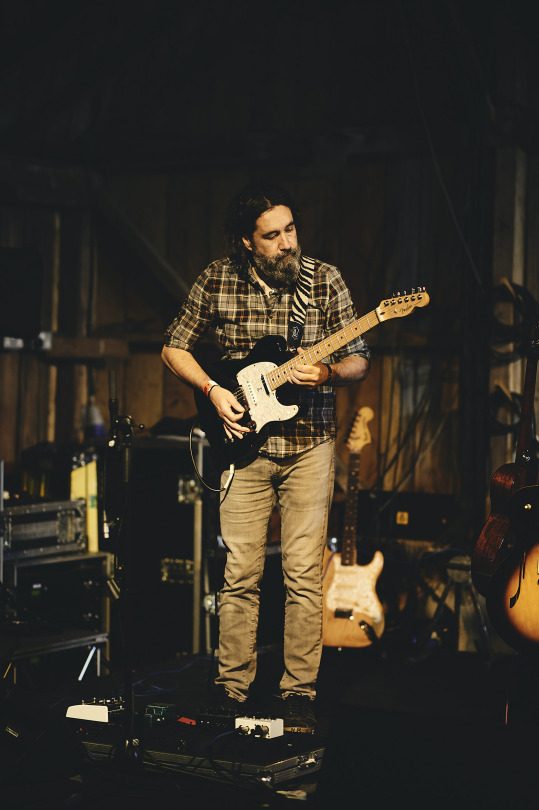
Kelly Bayfield made her second barn appearance with another stylish set drawn from the new album: Kelly taking to the piano to give us a new short number Sing which was twinned (“well, they’re a similar flavour, and in the same key!”) with her last single Hitchhiker, both oozing classy 70s chanteuse vibes and the latter closing in some great Telecaster work from Andy Trill in a majestic closing solo.
There’s not much that’d drag us away from a Kelly performance early, but having spotted his programme picture (“Long hair, Les Paul? That’ll do!”) we pottered down to the open air Green Stage for David Banks and his band. He did exactly what we thought it said on the tin: lots of Springsteen/Petty influenced muscular Americana with a dash of Molly Hatchett topped with excellent southern-fried guitar and classic ‘big endings’… marvellous.
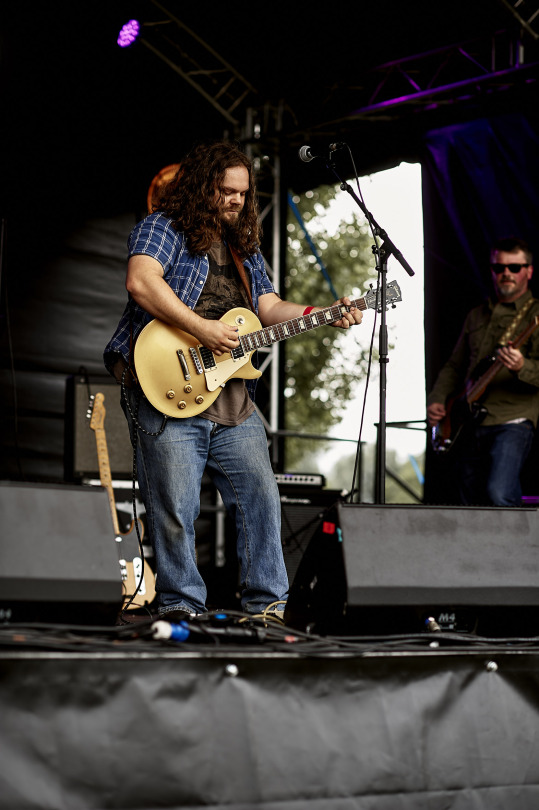
He was followed by Simon Stanley Ward (another ‘old fave’) who brought his Jonathan Richmanish irreverence and wit to Old Time Country in Excuse Me While I Feel Sorry For Myself; the Graceland-African-style I’m A Worrier (”…that’s worrier, not warrior”) a swinging rock’n’roller Bigfoot, Baby (Eddie Cochran meets cryptobiology) and Rocket In The Desert (the salad leaf not the projectile) with its Lawrence Of Arabia theme tease. While lampooning his own assumed-Nashville twang in American Voice the accompaniment was as echt as you could want, and the deadpan humour of Beluga Whale was sung to a properly stirring Journeyesque anthem.
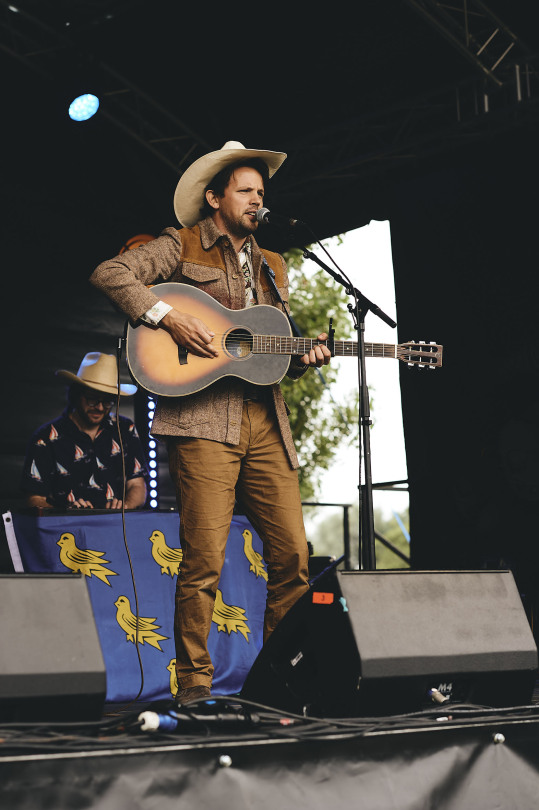
As it wasn’t raining The Green seemed the place to stay, where Forty Elephant Gang came next. Reviewing their album we were a little sniffy about their ‘crowd-pleasing festival songs’ but aside from the field holler-meets-O Brother Where Art Thou-style Songs Of Praise, this set was mostly the ones we’d liked: the relaxed Tex-Mex of Strange Things Happening with three-part harmonies and intertwining mando’n’guitar lines; the melancholic waltz of Young Man’s Game and the Squeeze-y domestic wit of Drunken Promise Song. A final ‘crowd-pleaser’ came in the chugging bluesy Hands Out Your Pockets, an instruction the assembled masses eagerly followed to add the required clap-along.
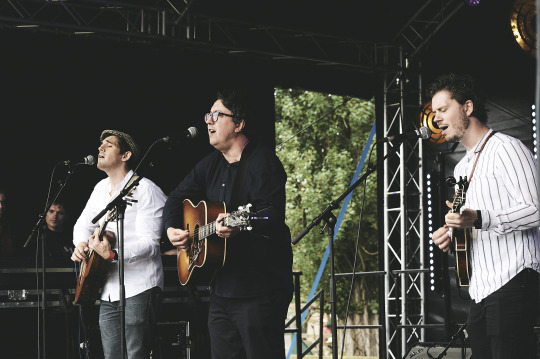
Sam Chase Trio made another appearance at The Green, wooing the larger crowd with both edgy humour (including praising UK portaloos in comparison to US versions, and introducing Everyone Is Crazy But Me as “a children’s song... now, what they mean is that it’s simple, since kids are generally at the dumber end of the spectrum”), and songs as varied as the fiery protest of What Is All The Rage and the haunting, wistful Lost Girl, (from the “Faustian Spaghetti Western Of Epic Proportions Known As The Last Rites Of Dallas Pistol”) sung by cellist Devon.
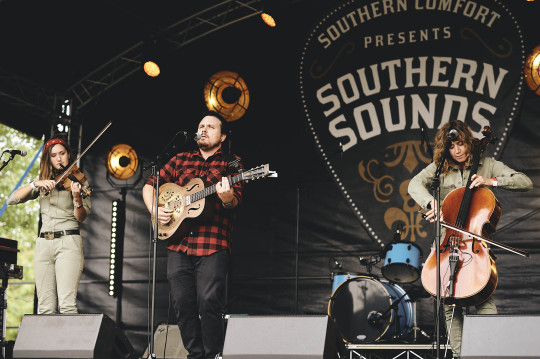
Now Plunger do like a bit of bluegrass, whether it’s grainy b/w Flatt & Scruggs clips from the 50s, through Sam Bush and New Grass to Béla Fleck and Greensky Bluegrass so The Folly Brothers should have been our kind of thing… however what we heard of them was more My Old Man’s A Dustman than anything Appalachian so we wandered off…
Back at The Barn Dean Owens and the Southerners drew a large and attentive crowd, but the popular Scot also left us a bit underwhelmed. Mellow, melodious troubadoury country that wouldn’t have been out of place on a mid-afternoon 70s Radio 2 show, the kind of thing that takes a deep listen in your bedroom to appreciate the stories told: very easy on the ear for sure but without any particular thing to grab us at a festival.
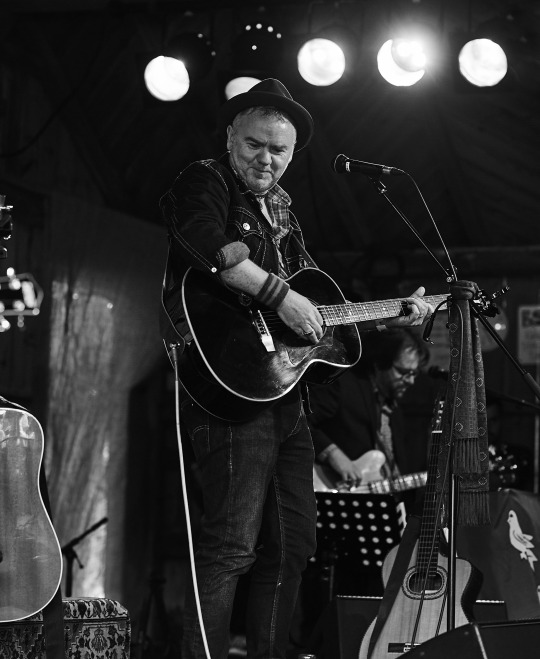
After an abortive attempt to catch Ella Spencer and her accompanist at The Moonshine (an extremely long soundcheck with problems with feedback from pretty much everything they touched meant we gave up) we caught a snatch of Los Pistoleros as we rounded The Green: probably the most C.O.U.N.T.R.Y. thing of the weekend, complete with draggy fiddle, pedal steel and old time vocal harmonies… if I’d not left my cowboy boots at home I’d have been out line-dancing with the best of them.
Plunger had only just seen Alyssa Bonagura (with Tim De Graaw’s band) less than a week since. Here at The Barn she was nominally solo but Tim joined her to add sweet harmonies and mellow guitar to Alyssa’s polished Cali-country: her strong yet ethereal vocal equally at home in slow emotional confessionals or giggly upbeat Big Yellow Taxi-style big strummers.
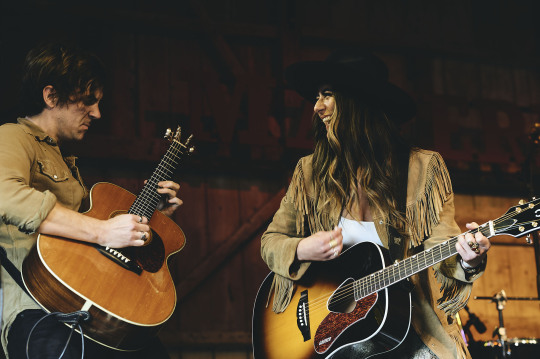
Listed only as ‘Dogs Play Dead’ it was only a lucky guess that took us down to The Green for what turned out to be Friday’s headliners Black Eyed Dogs playing a set of Grateful Dead classics. Mainly those with a countryish twist to them already, like Casey Jones, I Know You Rider and Friend Of The Devil; and bringing that flavour with fiddle and pedal steel to others like Truckin’, China Cat Sunflower, Playing In The Band and the epic closing Franklin’s Tower. All done with the right degree of loose, shambling rhythms and discursive noodling on guitar (and fiddle!) Fabulous stuff for grooving on the grass under what by now were glorious sunshine-filled blue skies.
Brooks Williams’ jangly sonorous acoustic and warm, smooth higher register vox was ideal early evening fare at the barn, in covers like Dave Alvin’s King Of California, traditional numbers like Deep River Blues and originals like the Gordon Lightfootish melancholy of Frank Delandry, and the damp-eyed nostalgia of Palomino Gold, aided toward the end of his set by some more excellent banjo from Dan Walsh.
The USP of Eddy Smith & the 507 is Eddy’s gravelly soulful voice, ideal for their bluesy-edged material, like the harp-led strut of It Don’t Feel Much Like Living and the new single Ticket Out Of Here, a bustling two-step with impressive three-part harmony vocals. They definitely have moved up a level since we last saw them a couple of years back.
Somehow we managed to miss Sarah Petite with her band completely on Friday, and almost all of her stripped-back Moonshine set on Saturday. Which was definitely our loss gauging by the brief snatch of crackling husky vocal over restrained bass and reverb laden guitar that we heard while hunting for a still-open toilet (a water supply problem having rendered all loos unusable for a considerable portion of the late evening... pretty much the only fly in the ointment all weekend!)
As the sun set the two-month date differential was beginning to tell: clear night skies in September aren’t quite the same as July and the growing chill was testing our stamina a bit. We headed for The Peacock and the tribute show to John Prine, hosted by Rich Hall. Pretty much every act who was on site came to do a turn in honour of the recently-deceased songwriting legend, with their own favourite from his oeuvre. Kelly Bayfield band gave us Hello In There, Tim De Graaw with Alyssa did That’s The Way The World Goes Round, Alyssa gave us the obligatory Angel From Montgomery, and Simon Stanley Ward (plus Kelly) gave a fantastic rollicking Lake Marie. Entirely in character, Sam Chase Trio broke the mould and gave us their own tribute song John Prine.
Rich Hall had to skip out on MC duties to attend his own set at The Barn: sacrilege to say, but the appeal of stand up (even to music, even from such a big name) palled a little. It was getting bitterly cold (you could see your breath hanging in the air) and given that what we could hear of his set was the same as we’d heard last time he was here we spent much the time attempting to warm up with piping hot beverages. However it was by far the rammedest set of the weekend, with the tightly-packed crowd spilling out of The Barn for some distance.
Jon Langford was unsurprisingly somewhat hindered by the draw of Rich Hall (which left The Peacock a bit underpopulated!) His spiky, punky approach wasn’t entirely our bowl of chilli, although the rendition of Eddie Waring (originally by Help Yourself with Deke Leonard and BJ Cole, who was sitting in with Jon tonight) was very good.
The programme description of headliner Jerry Joseph did its best to weaken our staying power too: with our deep suspicion of any write-ups that include the ‘p-word’, and somewhat incredulous of the mention of ‘jam bands’, Jerry looked like he wouldn’t be our kind of thing at all. However he didn’t live down to expectations (wholly). A very animated stage-prowling audience-provoking figure in shorts and no shoes, there was no shortage of energy even if it was largely unchannelled and could get a little wearing… (maybe it was that, maybe it was the chill, but The Barn steadily thinned out during his set, ending less than half full). War At The End Of The World was the pick of the bunch, although like most of his material it would probably have sounded better with a band (like, erm, Stockholm Syndrome, which he co-founded; or, erm, Widespread Panic who he has written for… so much for our ‘jamband incredulity’!)
While it might have ended as a bit of a test of endurance, there were more than enough high points to make Saturday another enjoyable Maverick experience.
“Did we do it for love? Did we do it for money? More like stubborn dumb persistence and hot chocolate, honey…”
0 notes
Text
Brief Review: Buck Privates (1941)
Rated the film 2.5 stars out of 5. The comedy style of Abbott & Costello through the lens of a military setup seems like a great concept, but their shtick tends to misfire more than it lands in this outing. The film, however, is saved by the musical moments, most notably in the iconic song by The Andrews Sisters, “Boogie Woogie Bugle Boy of Company B“. The song-and-dance number is very much the definition of show-stopper, not quite fitting with the comedy material or romantic subplot that surrounds it. Unsurprisingly, the film earned an Oscar nomination for the song, sadly losing to “The Last Time I Saw Paris” from Lady Be Good, while the remaining score by Charles Previn earned the film’s second nomination, but expectedly losing to Dumbo for its incredible music (especially the “Pink Elephants on Parade” sequence). Nevertheless, Buck Privates also earns a spot on the 101 War Movies You Must See Before You Die list, but this seems solely deserved by the iconic song with the remaining production values (including script and other songs) faltering by comparison. Still, with the magnitude of the song persisting over time, it seems appropriate for the film to be recognized on this list due to this single reason, the Andrews Sisters delivering it flawlessly to warrant watching the entire film.
https://www.imdb.com/title/tt0033436/
0 notes
Text
SUBSCRIBESON TUNG M-TP – “HÃY TRAO CHO ANH” | GIVE IT TO ME

Nguyễn Thanh Tùng, who is now professionally known as Son Tung-M-TP (born July 5, 1994) is a Vietnamese artist from Thái Bình, Thái Bình Province. He is multi-talented in his music artistry with genres ranging from pop, to R&B to EDM. According to his parents, he was born to be a singer and they realized he was vocally talented at the young age of just two years old! He speaks of his style being heavily influenced by listening to his grandparents singing Vietnamese folk as he grew up.
He is most recently recognized for his song titled Hay trao Cho anh (Give it to Me) https://www.youtube.com/watch?v=knW7-x7Y7RE, which features Snoop Dog himself, and the video (directed by Korlio) stars another name on the rise, Madison Beer. Hay trao Cho anh was released in 2020 and has already won the Green Wave award for top 10 most favorite songs as well it has unsurprisingly been nominated for a large handful of other notable awards. This track is a perfect blend of hip-hop, a sprinkle of reggaeton topped off nicely with some deep tropical house, resulting in a delightful summer playlist pick.

Another very impressive accomplishment that Son Tung-M-TP has made is being the first Vietnamese artist to hit the American Billboard. He has also hit a Vietnamese youtube record with an astonishing 8 million subscribers! He has won a total of 7 Green Wave awards as well as MTV Europe Music Award, a Dedication Music Award, and a Mnet Asian Music Award. He has also been included in Forbes 2018 30 under 30. His latest tour, titled Sky Tour can be watched on many streaming services including Netflix. He does not have any upcoming tour or concert dates scheduled for 2021 at this time, however that may change. He has told the media that by the age of 30 he will no longer be pursuing a music career. He has stated that is the time for him to settle down and marry and be a “good son” to his parents. He talks highly and excitedly of starting a family and beginning the next chapter in his life.
Youtube: https://www.youtube.com/channel/UClyA28-01x4z60eWQ2kiNbA
Instagram: https://www.instagram.com/sontungmtp/?hl=en
LISTEN to AUDIO VERSION by Eliza Newell

Eliza Newell
The post SUBSCRIBESON TUNG M-TP – “HÃY TRAO CHO ANH” | GIVE IT TO ME appeared first on rBeatz Radio.
from rBeatz Radio https://ift.tt/2T9OSpZ
0 notes